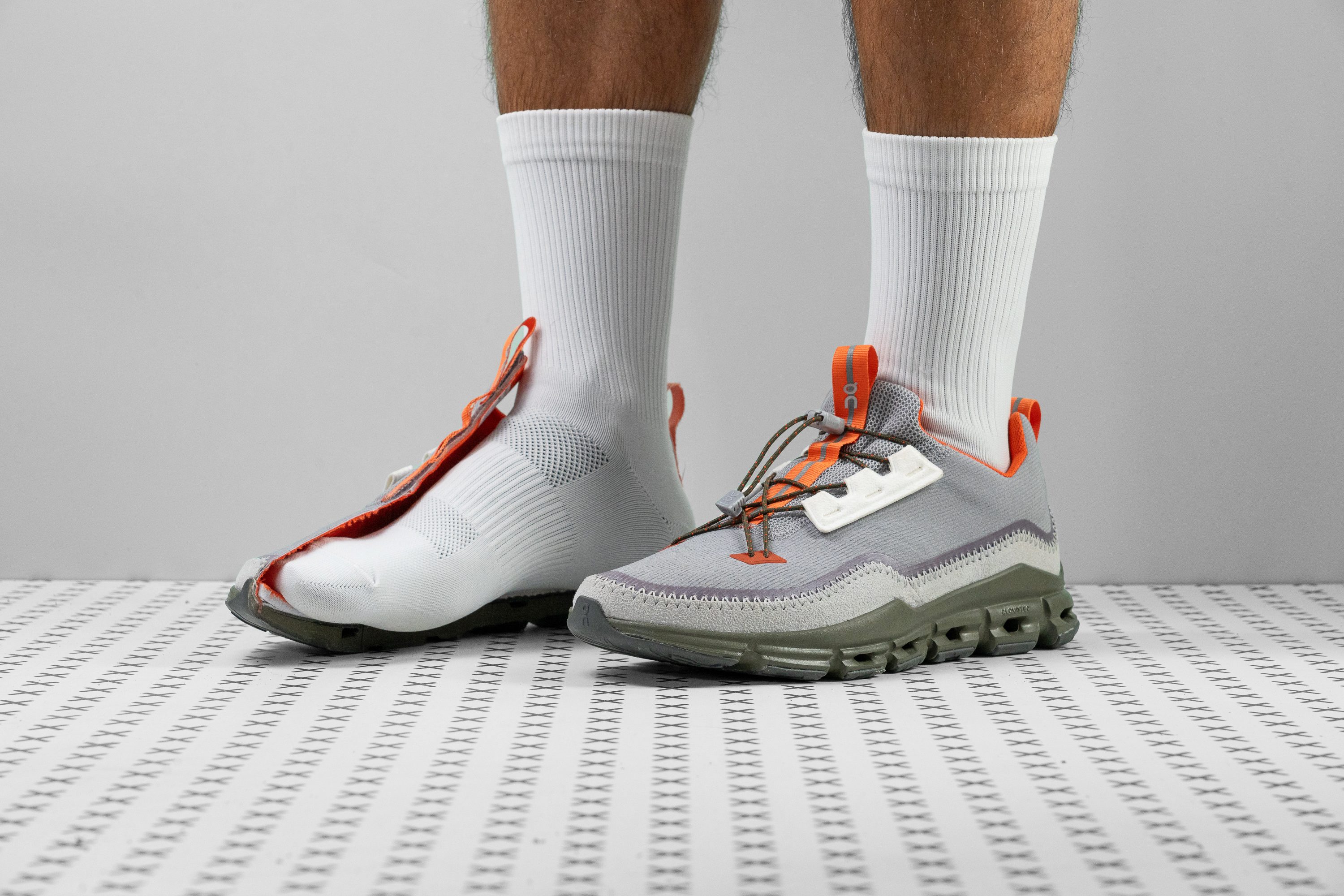Our verdict
- Our top pick in best On walking shoes
Pros
- Can go from city to trails
- Great for all-day wear
- Surprisingly lightweight
- Sock-like fit
- Quick-to-adjust lacing
- Feels supportive
- Quite durable
- Good traction
- Exclusive look
- Uses recycled materials (20%)
- Reflective details
Cons
- Not breathable
- Firm cushioning
Audience verdict
- Top 23% in On walking shoes
- Top 25% in shoes for walking on concrete
Comparison
The most similar walking shoes compared
+ + Add a shoe | |||||
|---|---|---|---|---|---|
| Audience score | 90 Great! | 84 Good! | 80 Decent! | 88 Good! | |
| Price | $140 | $140 | $150 | $150 | |
| Arch support | Neutral | Neutral | Neutral | Neutral | |
| Condition | - | Heavy personPlantar fasciitis | - | Heavy personPlantar fasciitis | |
| Orthotic friendly | ✓ | ✓ | ✓ | ✓ | |
| Weight lab Weight brand | 9.9 oz / 282g 9.9 oz / 280g | 10.9 oz / 309g 10.9 oz / 309g | 8.7 oz / 247g 9.4 oz / 266g | 9.6 oz / 271g 10 oz / 284g | |
| Lightweight | ✓ | ✓ | ✓ | ✓ | |
| Breathability | Warm | Warm | Breathable | Moderate | |
| Use | For standing all dayCityDisneyEurope | For standing all dayCityDisneyEurope | TravelFitnessFor nurses | For standing all dayWorkCityDisneyEuropeFitnessFor nurses | |
| Midsole softness | Firm | Balanced | Firm | Firm | |
| Difference in midsole softness in cold | Normal | Big | Small | Normal | |
| Insole thickness | Average | Average | Thin | Average | |
| Removable insole | ✓ | ✓ | ✓ | ✓ | |
| Stiffness | Moderate | Stiff | Flexible | Moderate | |
| Difference in stiffness in cold | Normal | Big | Big | Big | |
| Torsional rigidity | Stiff | Stiff | Flexible | Stiff | |
| Heel counter stiffness | Flexible | Moderate | Flexible | Moderate | |
| Heel tab | Finger loop | Finger loop | None | None | |
| Drop lab | 9.5 mm | 8.0 mm | 9.9 mm | 16.8 mm | |
| Heel stack lab | 31.0 mm | 34.1 mm | 28.7 mm | 36.1 mm | |
| Forefoot | 21.5 mm | 26.1 mm | 18.8 mm | 19.3 mm | |
| Toebox width at the widest part | Wide | Medium | Medium | Medium | |
| Toebox width at the big toe | Medium | Narrow | Medium | Medium | |
| Closure | Bungee lacesSlip-on | Bungee laces | Laces | Laces | |
| Toebox durability | Decent | Good | Bad | Bad | |
| Heel padding durability | Bad | - | Bad | Bad | |
| Outsole durability | Good | - | Decent | Good | |
| Midsole width in the forefoot | Average | Average | Narrow | Wide | |
| Midsole width in the heel | Average | Average | Average | Average | |
| Outsole hardness | Hard | Average | Average | Average | |
| Outsole thickness | Average | Average | Average | Average | |
| Tongue padding | Average | Average | Very thin | Average | |
| Tongue: gusset type | Sock like | None | None | Both sides (full) | |
| Ranking | #10 Top 35% | #26 Bottom 10% | #28 Bottom 3% | #17 Bottom 41% | |
| Popularity | #14 Top 49% | #4 Top 14% | #22 Bottom 24% | #15 Bottom 48% |
Who should buy
The Cloudaway from On is for the adventurous people who never know how far they’ll go stepping out of the doorway. In our opinion, this is a great all-arounder if you need a shoe for the following:
- feeling equally comfortable on the city streets and when hopping on a trail
- spending all day walking and standing
- traveling: commutes, flights, sightseeing, etc.
- a walking shoe with some stylish "edge" to it
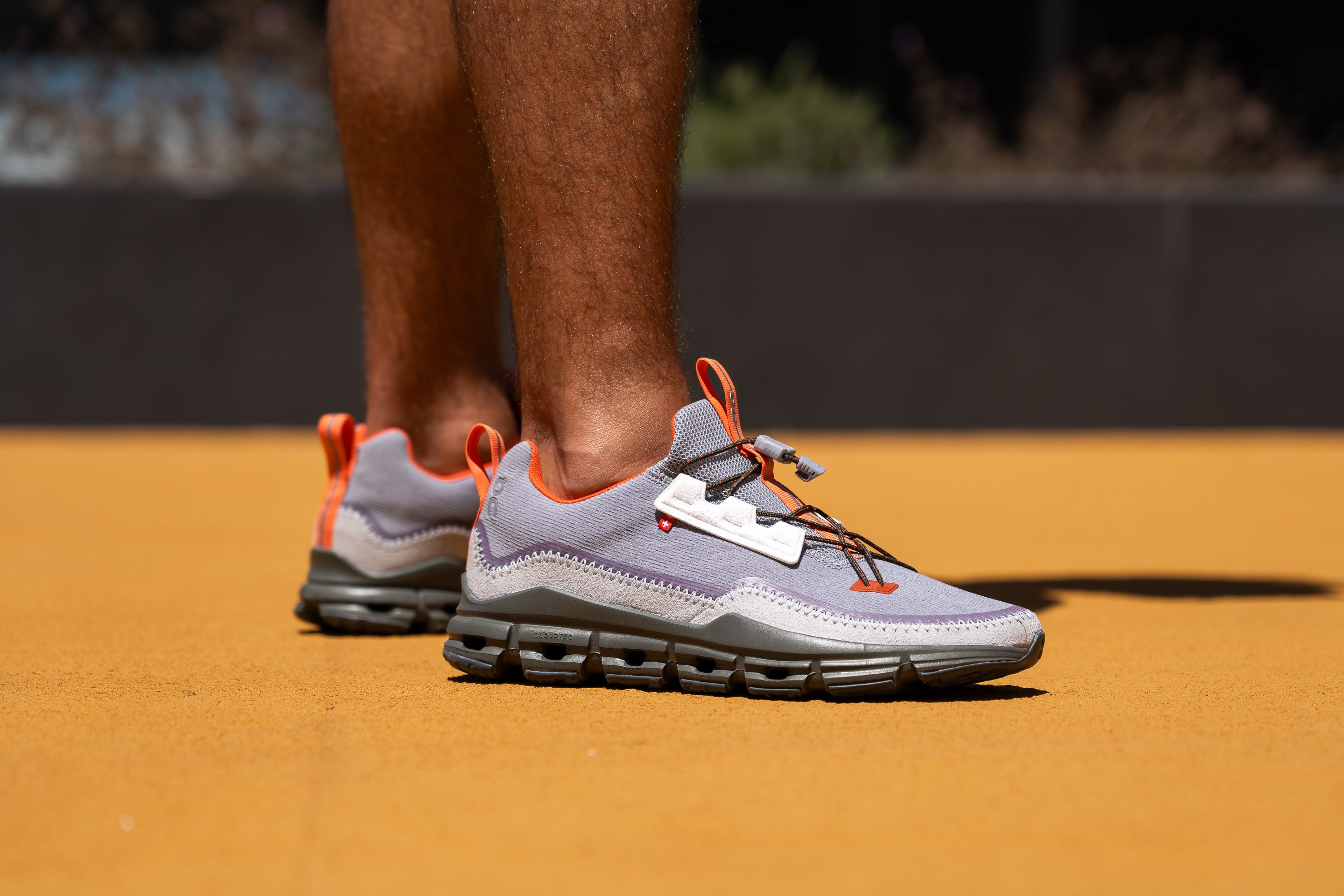
Who should NOT buy
Being a hybrid shoe, the Cloudaway makes some compromises to versatility (like weight and breathability). So, if you need a shoe for urban settings only, a better option would be On Cloud 5 or On Cloudswift.
On the other hand, if you are more outdoorsy and need an even more rugged and protective trail shoe, consider our selections of the best trail running shoes and best hiking shoes.
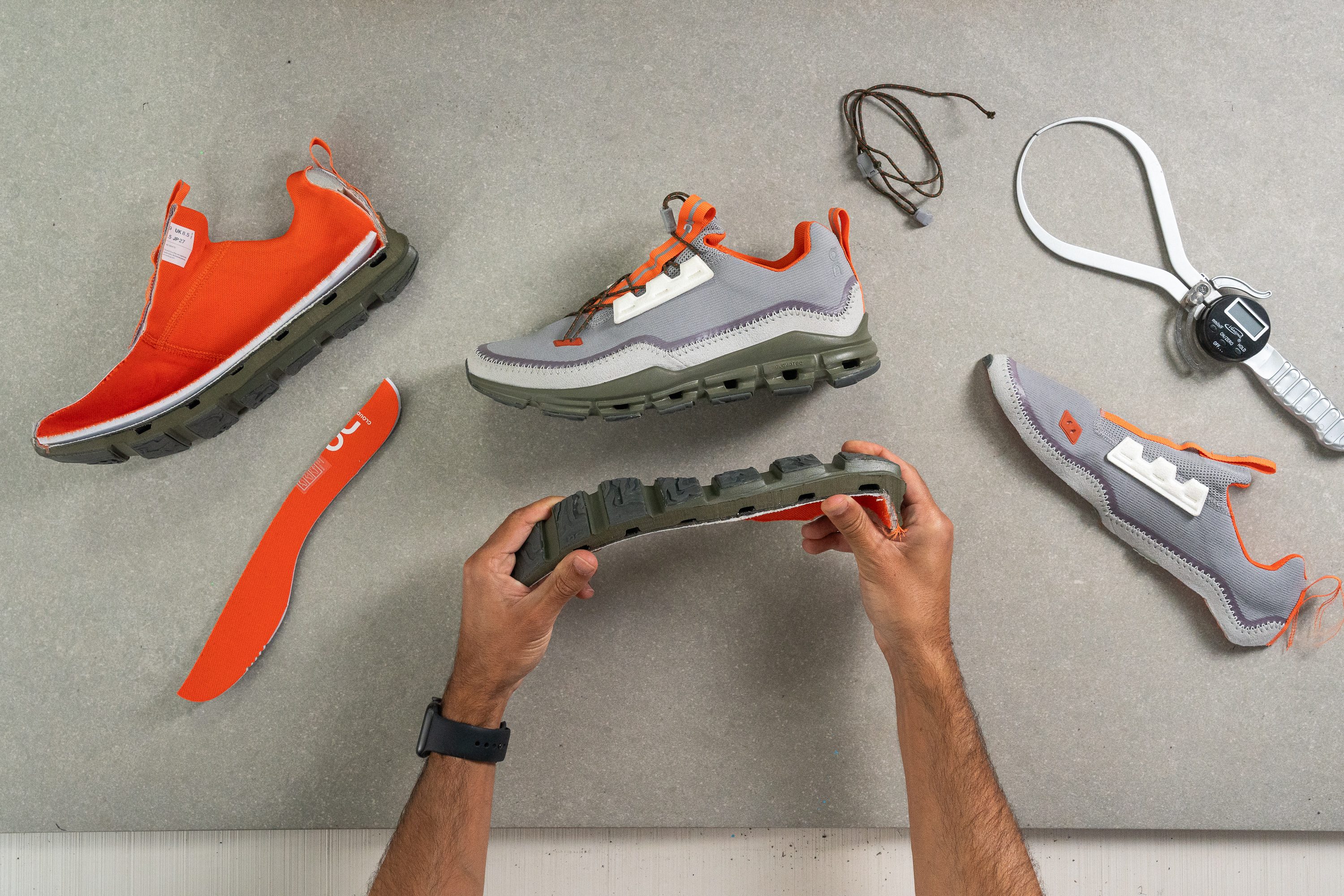
Breathability
The Cloudaway loses its breathability in favor of a more durable upper. Pumping smoke through the shoe's upper showed a tiny string of air passing through the material. On a 1-5 scale, this On shoe gets the lowest score of 1.
You can see how no light is able to pass through the upper in our transparency test below.
Turning to our microscope for a more up-close shot, we saw an incredibly tight weave. We normally see this type of material on waterproof trail shoes.
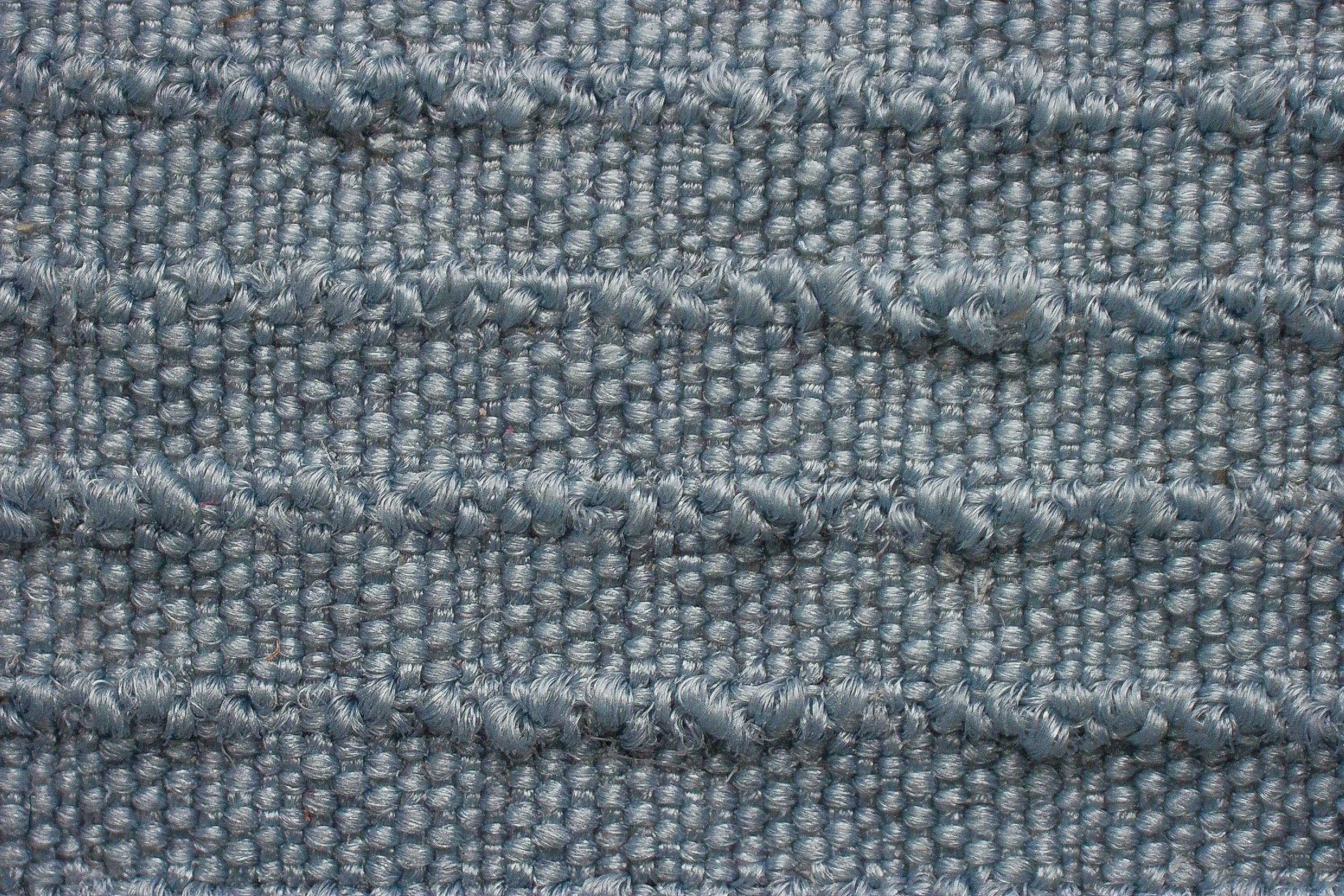
| Cloudaway | 1 |
| Average | 2.7 |
Durability
Toebox durability
Applying a Dremel to the shoe's toebox, we were satisfied with its ability to resist wear and tear. After drilling the material for 4 seconds, we only got through the shoe's topmost layer.
However, based on this test, the Cloudaway is still not the most durable shoe on our list. We rated it as 3 out of 5.
If you need a more abrasion resistant upper, see the Hoka Transport.
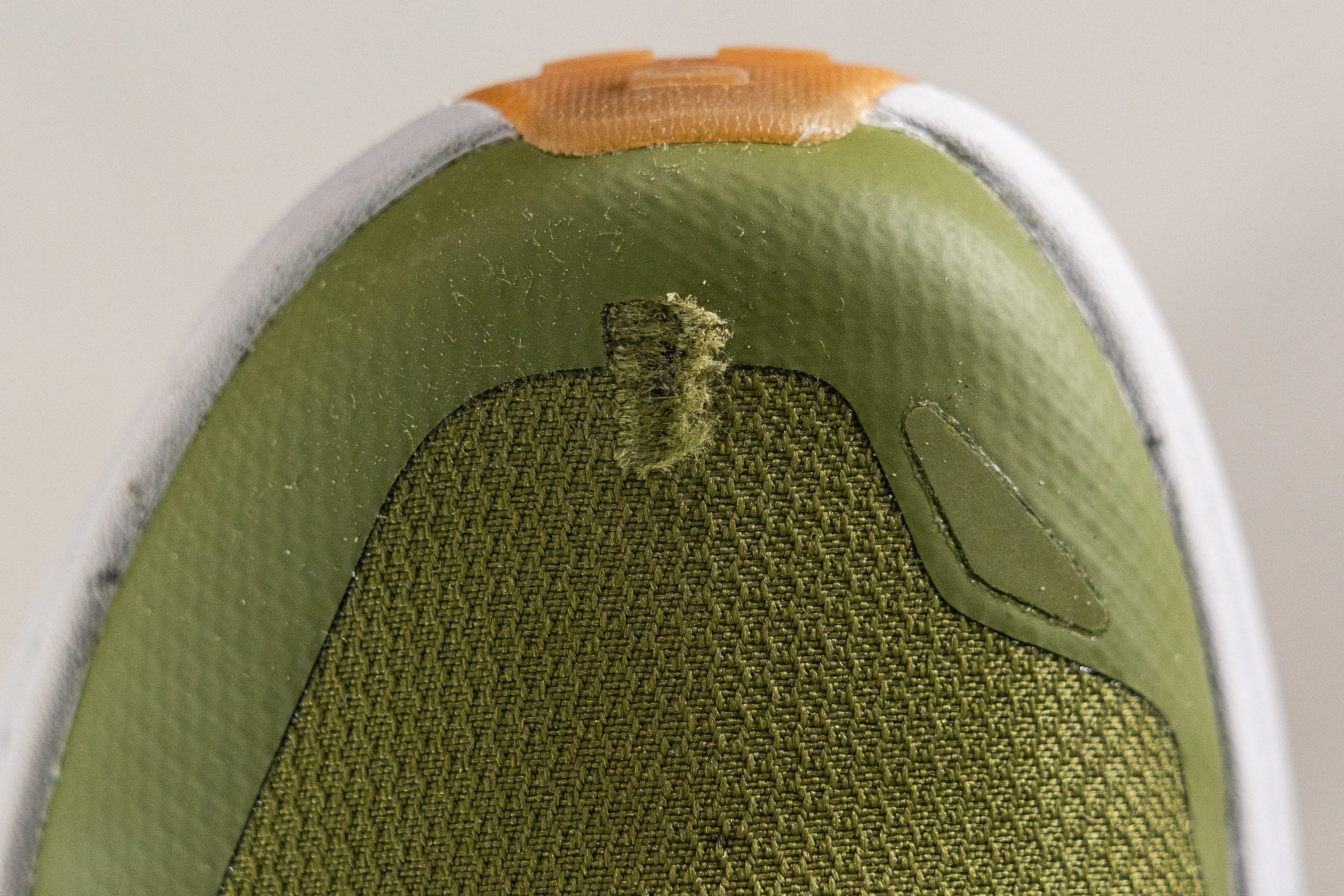
| Cloudaway | 3 |
| Average | 3.2 |
Heel padding durability
However, the material surrounding the ankle in the Cloudaway was a real disappointment.
It barely survived the same 4-second Dremel test, showing some really serious wear. Thus, we has to give it the lowest score - 1 out of 5.
| Cloudaway | 1 |
| Average | 2.3 |
Outsole hardness
On the bright side, the outsole looks much better on the Cloudaway! The brand really made sure that it survives on the trails.
We start by measuring how firm the rubber is because, in our experience, harder rubbers are much harder to destroy.
The durometer showed a whopping reading of 89 HC in this On Cloud shoe! This is not only 14% firmer than the average of walking shoes but is even harder than some hiking shoes! Impressive!
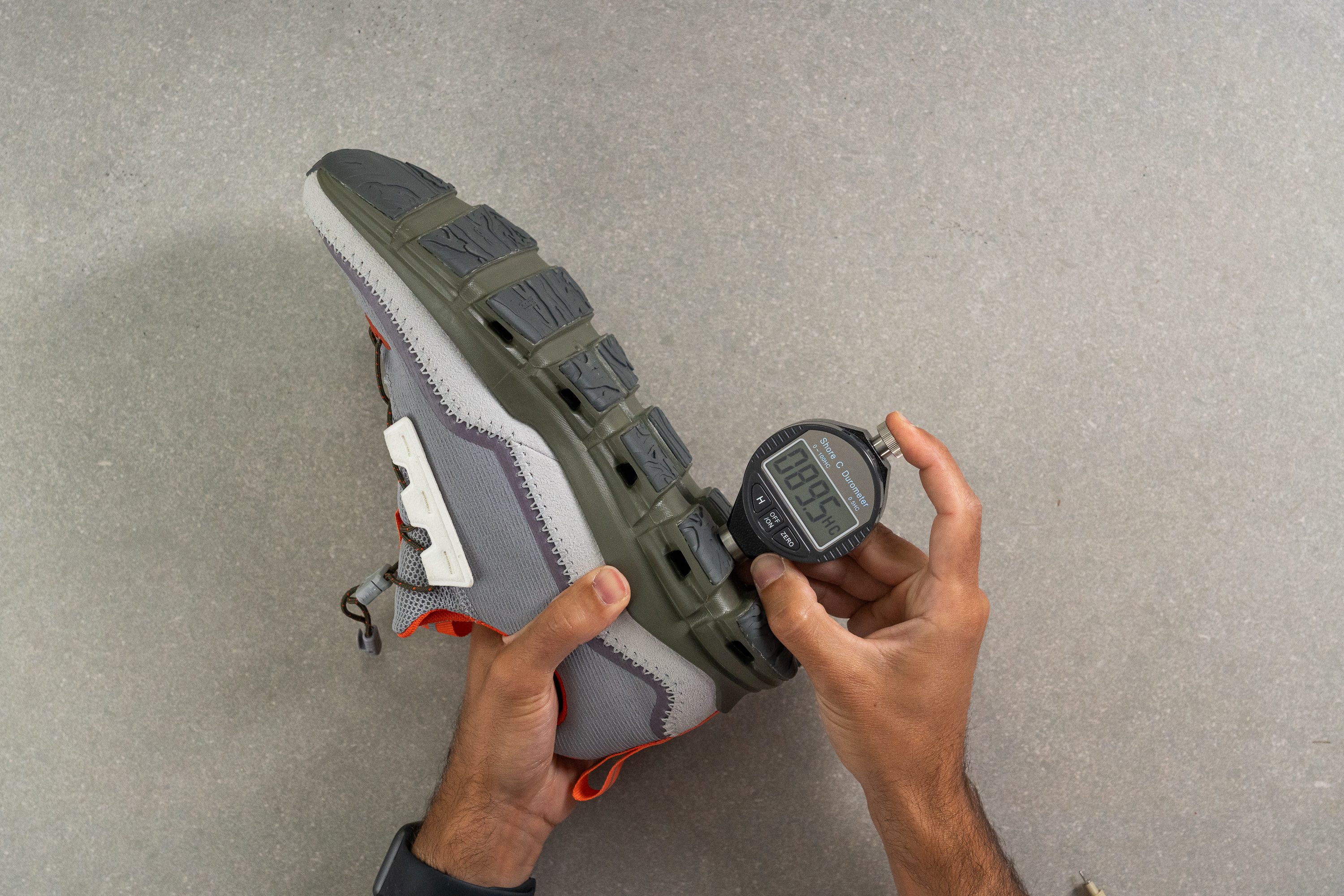
| Cloudaway | 89.0 HC |
| Average | 76.3 HC |
Outsole durability
We further challenged the rubber with a Dremel by holding it for a good 22 seconds.
The damage was visible but didn't seem so critical.
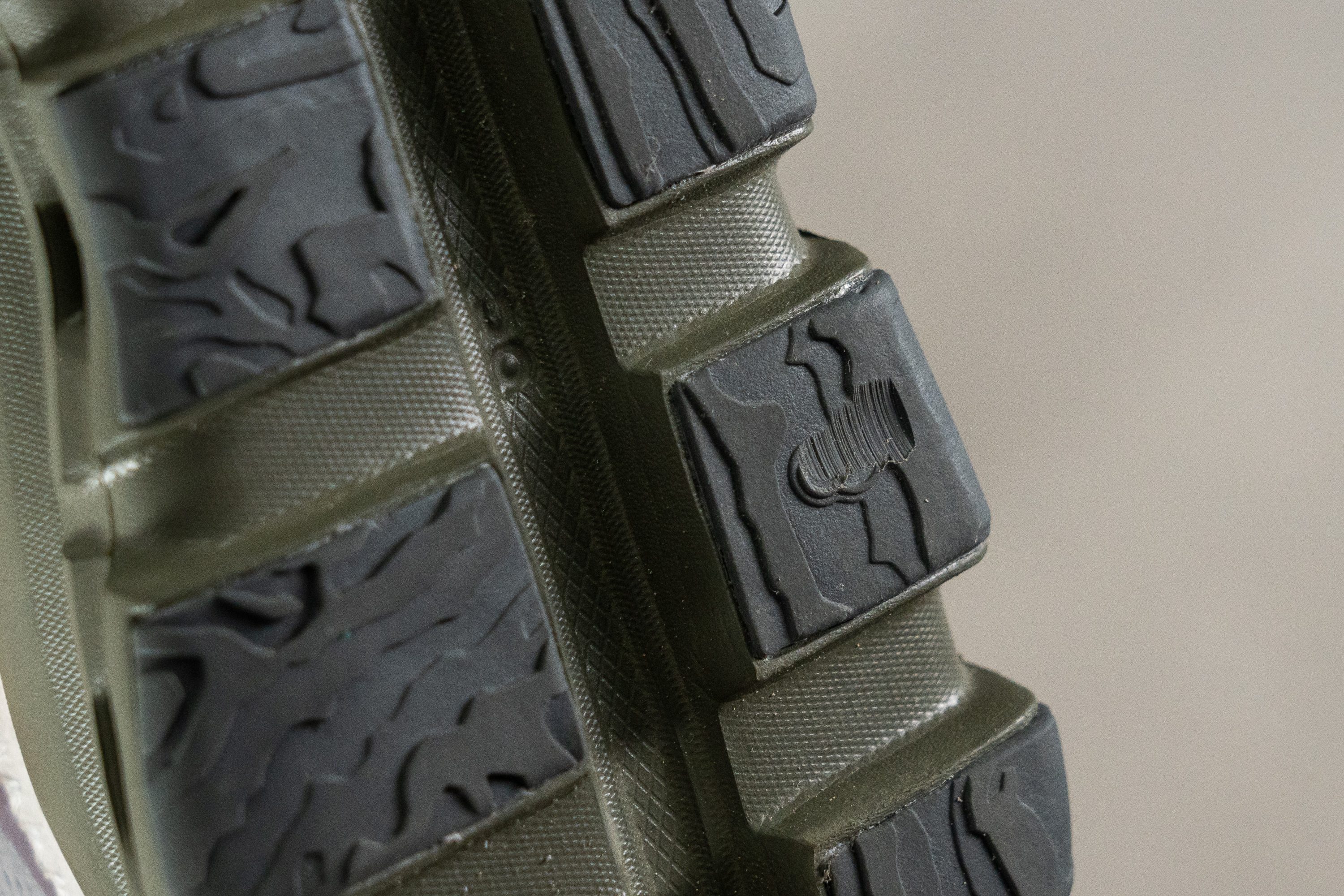
We measured the depth of the dent with a tread gauge and found that the damage is indeed smaller than average. The tool showed 0.69 mm of wear whereas walking shoes on average get a 0.8 mm dent.
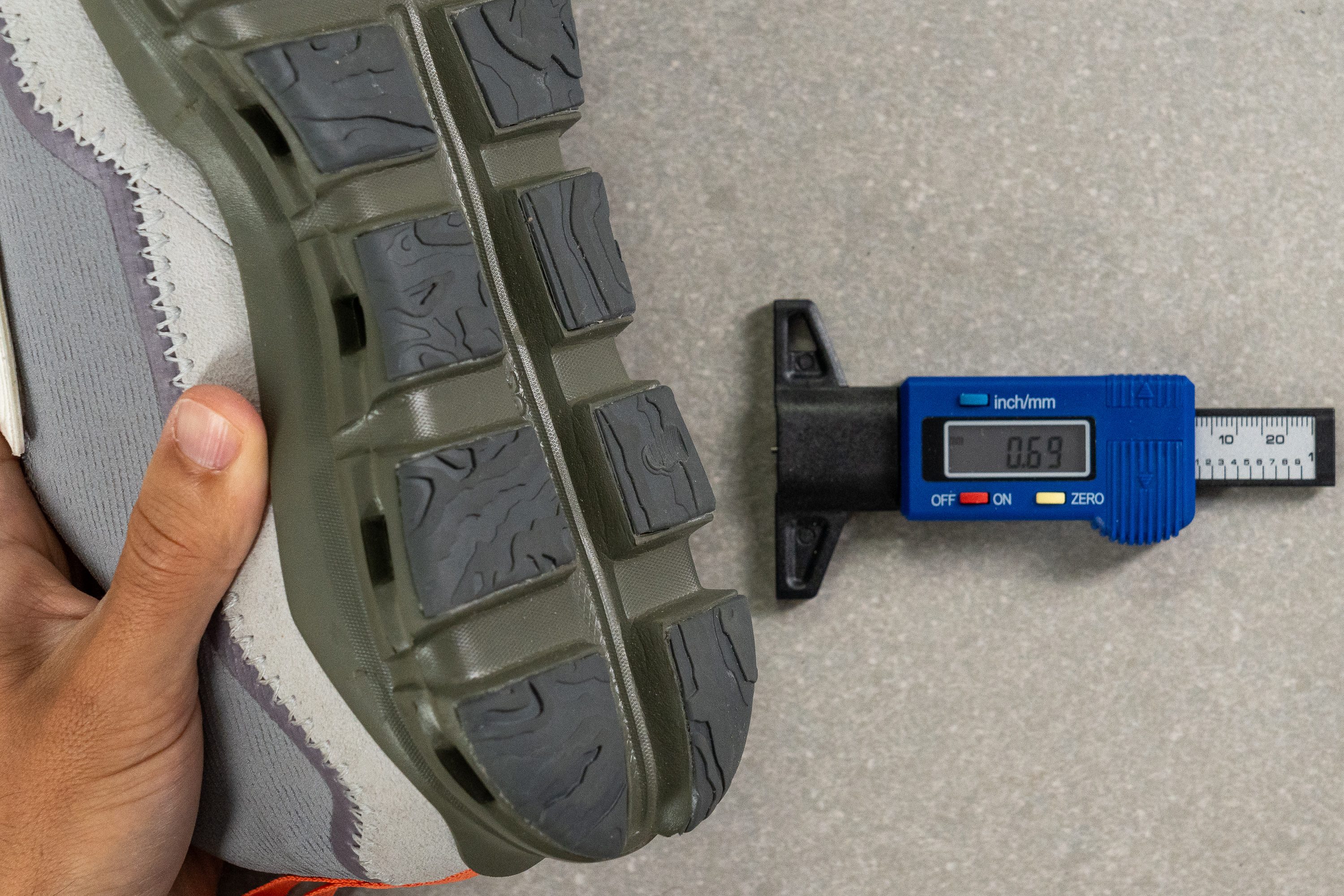
| Cloudaway | 0.7 mm |
| Average | 1.5 mm |
Outsole thickness
The outsole also turned out to be thicker than average. Our caliper returned 3.5 mm which is 1 mm thicker than walking shoes on average.
This is yet another bonus point to the shoe's outsole durability.
All things considered, we believe that this walking shoe will have a long and happy life. At least 500 miles is guaranteed!
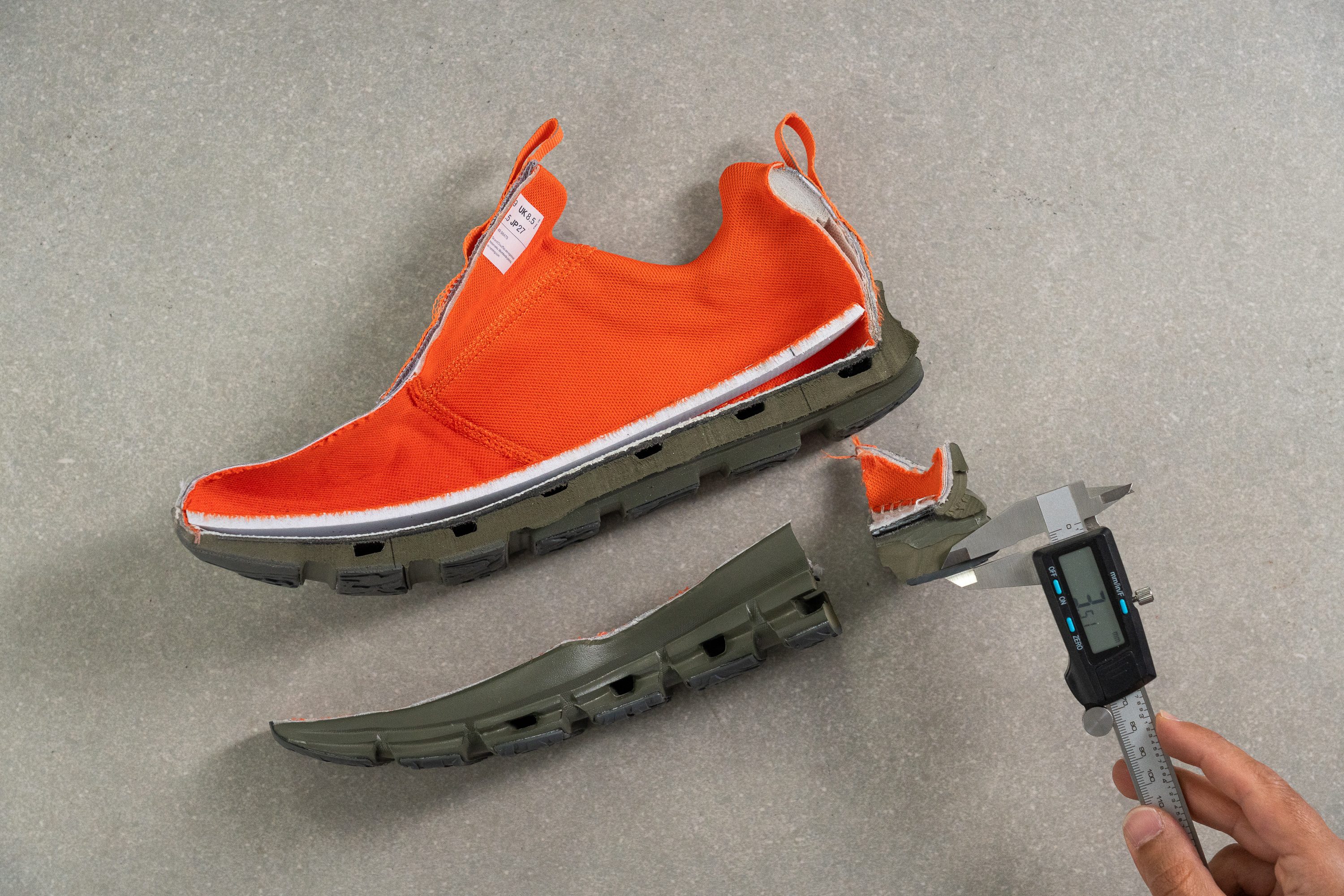
| Cloudaway | 3.5 mm |
| Average | 2.8 mm |
Weight
Being a trail-ready shoe, the On Cloudaway simply couldn't be lightweight. Comprised of sturdier materials to brave the elements, it showed a higher number on our scales.
The shoe comes in at 9.9 oz (282g) which corresponds to the officially stated weight on the brand's website to the gram.
Compared to the average of our lab-tested walking shoes, this is 0.7 oz (21g) heavier. But the good news is that it doesn't really feel that heavy on the foot. In fact, it is even a little lighter than the average of our trail running shoes.
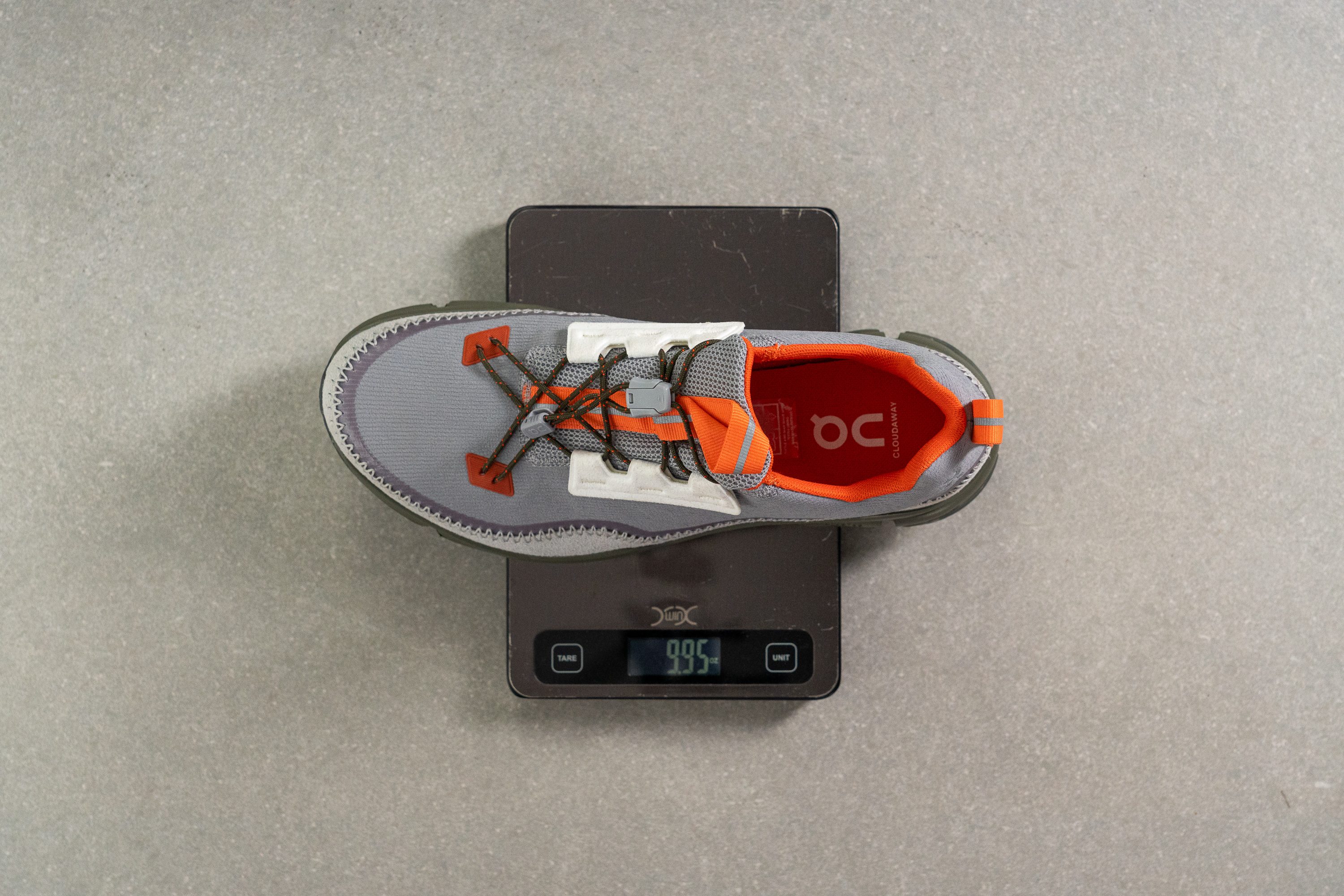
| Cloudaway | 9.95 oz (282g) |
| Average | 9.77 oz (277g) |
Cushioning
Heel stack
The On Cloudaway is packed with a good amount of cushioning. It kept us comfortable and supported throughout a few hours of testing on pavements and hard-packed trails.
Using a caliper to measure the shoe's stack height, we got 31 mm in the heel. This is the same as the average of all our walking shoes.
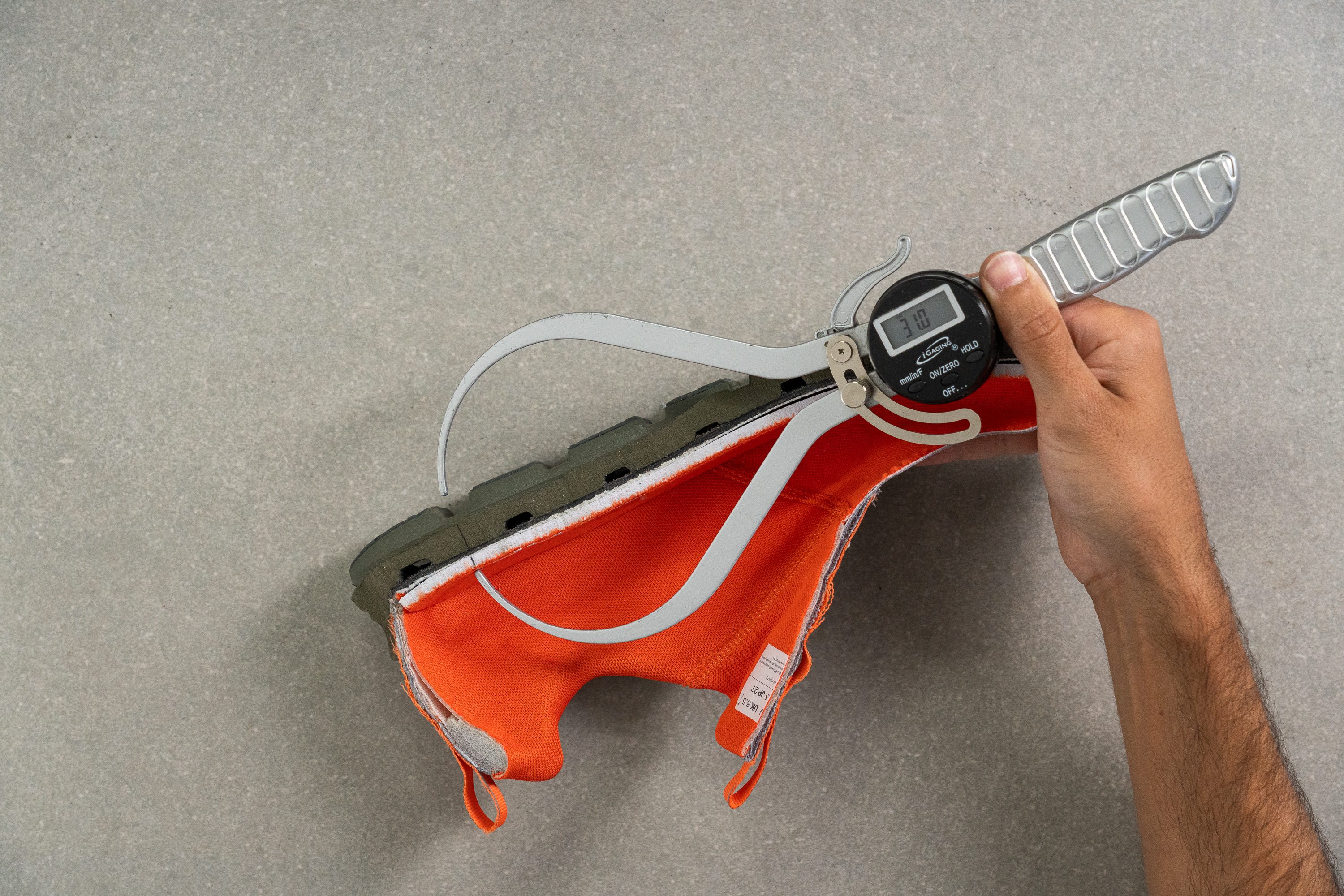
| Cloudaway | 31.0 mm |
| Average | 32.3 mm |
Forefoot stack
In the forefoot, the caliper showed 21.5 mm, which is even a little taller than the average.
From our experience, the Cloudaway felt sufficiently cushioned both in the heel and in the forefoot. It never left us wishing for more.
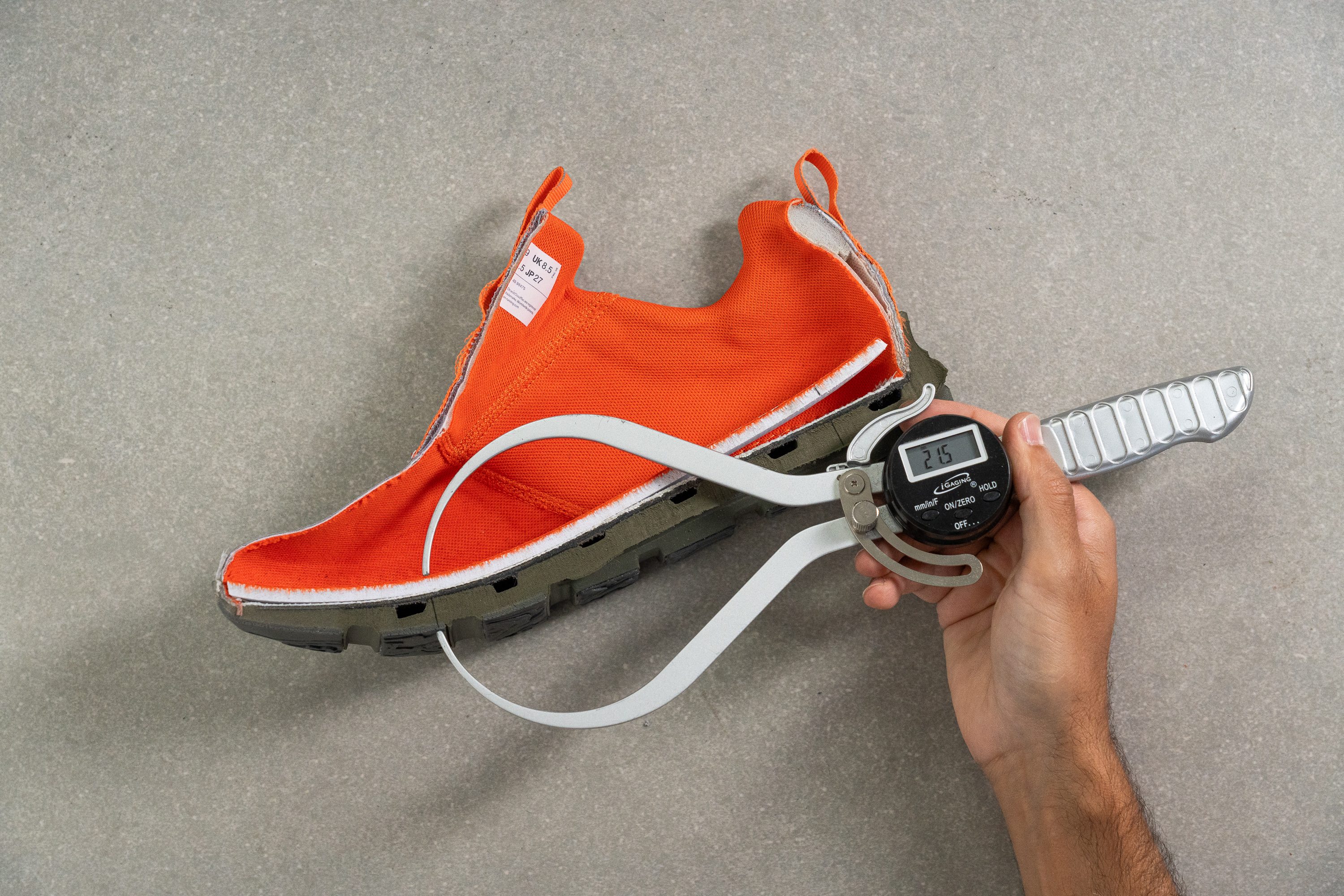
| Cloudaway | 21.5 mm |
| Average | 21.9 mm |
Drop
According to the brand, the Cloudaway has a drop of 8 mm. However, our own measurements show that it is 1.5 mm taller at 9.5 mm. While the difference is not that critical in this case, we would expect a more accurate measurement from the brand.
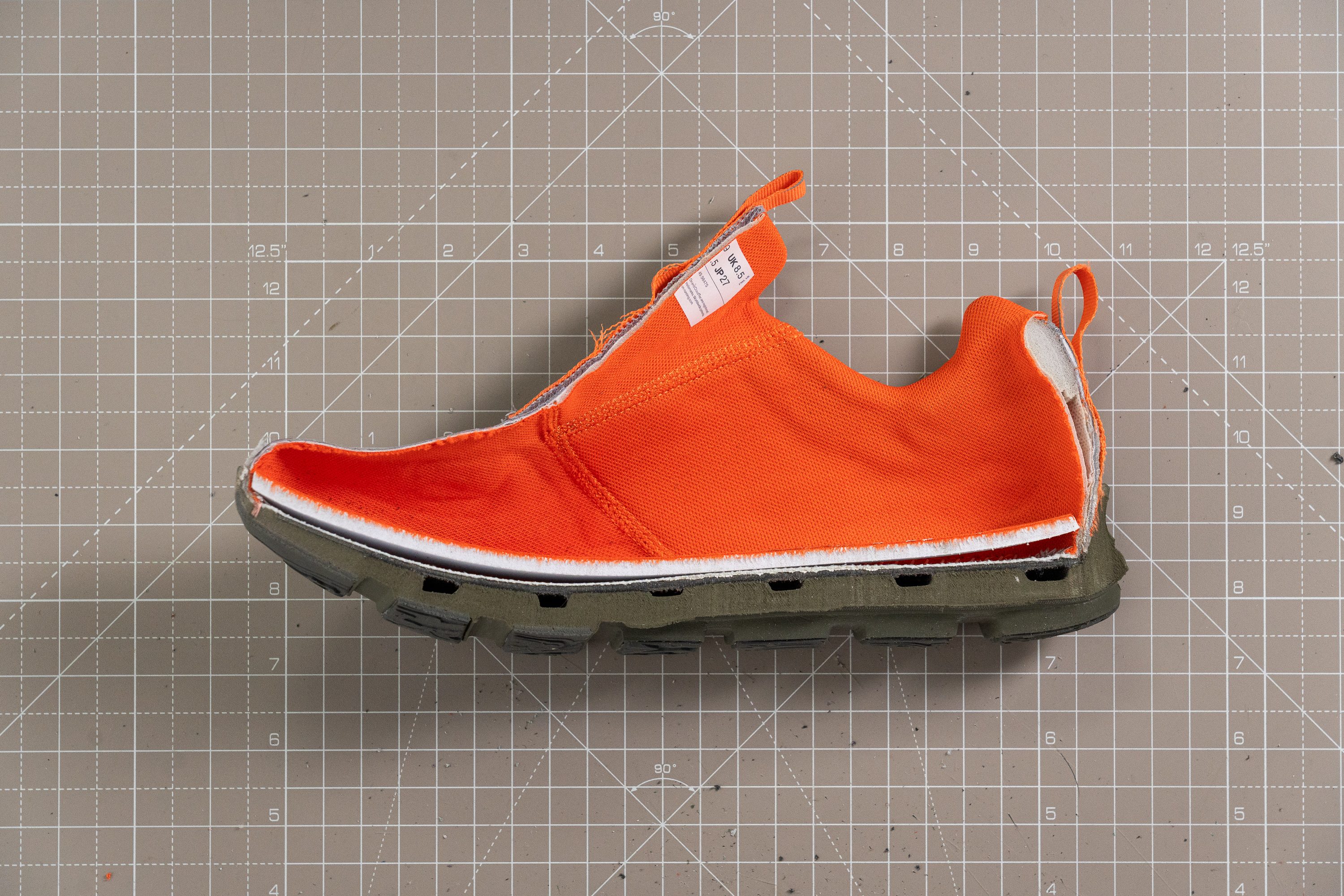
But for a walking shoe, any drop between 8 and 12 mm is considered a standard. You want a more elevated heel to catch your heels as you land with each step.
| Cloudaway | 9.5 mm |
| Average | 10.4 mm |
Midsole softness
No squish, no plush. Just like many other On shoes, the Cloudaway has a pretty firm midsole.
Our durometer shows 32 HA when pressed against the shoe's foam in the heel. This is a little firmer than the average and it definitely feels that way.
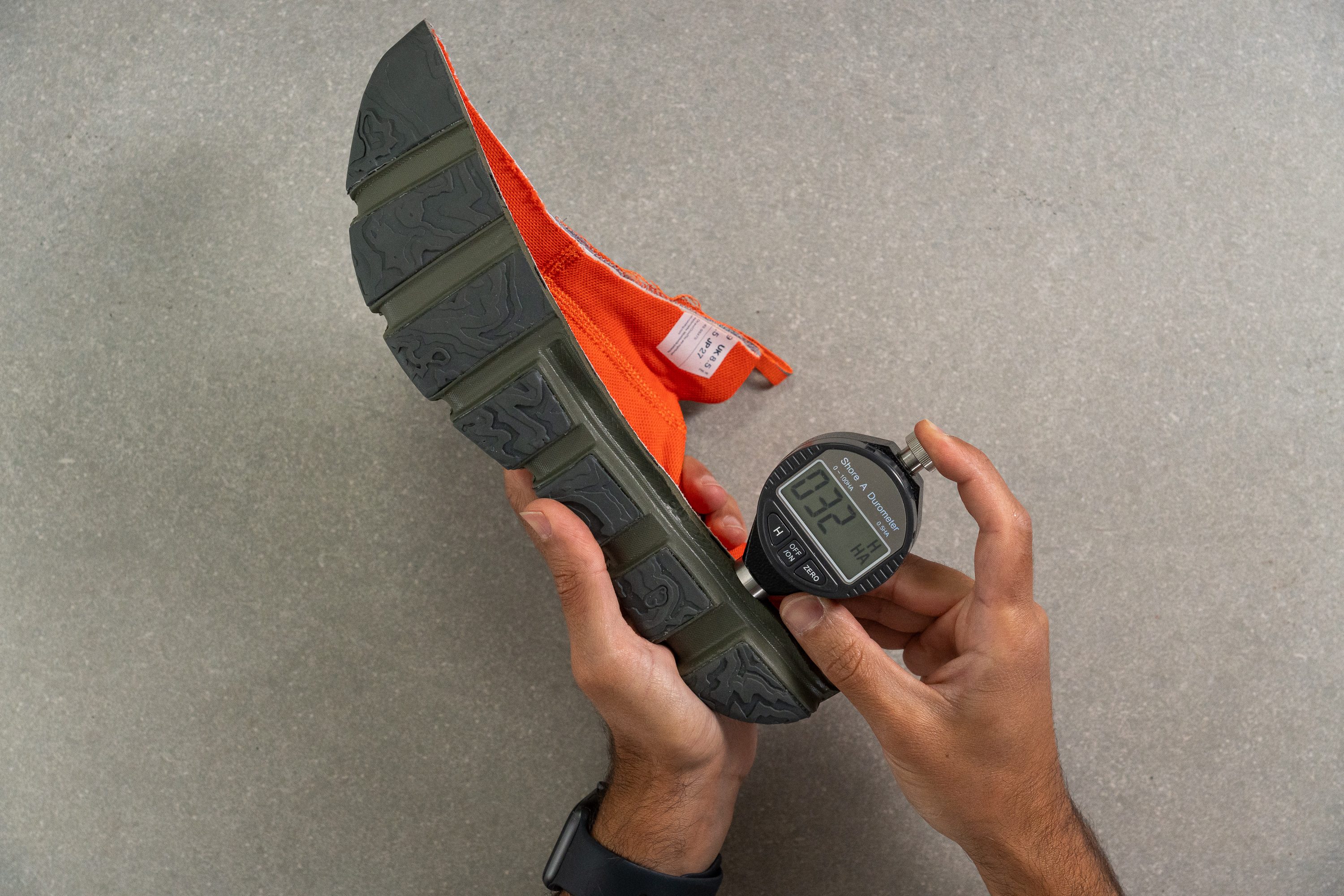
This may be confusing because, in the video, the CloudTec pods look pretty squishy in the heel. But one thing that we cannot show is how much force we are actually applying to achieve that.
But firm cushioning is not necessarily a death sentence. It's a matter of preference and it does make you feel more stable and planted. For that matter, our feet didn't feel fatigued after hours of walking in the shoe.
On the other hand, if you prefer a plusher ride, consider the Hoka Transport. It has a durometer reading of 21.9 HA.
| Cloudaway | 32.0 HA |
| Average | 24.6 HA |
Difference in midsole softness in cold
Please be warned that once the low temperatures kick in, the Cloudaway will turn into... an even firmer shoe.
To mimic a cold day, we put the shoe into a freezer for 20 minutes and then repeated the durometer measurement. The second time gave us 41.3 HA which is a little firmer than the average.
This could be a problem for those who weren't happy with the shoe's firmness in the first place.
Surprisingly, the difference in firmness was lower in the Cloudaway (28.9%) compared to the average (36.5%).
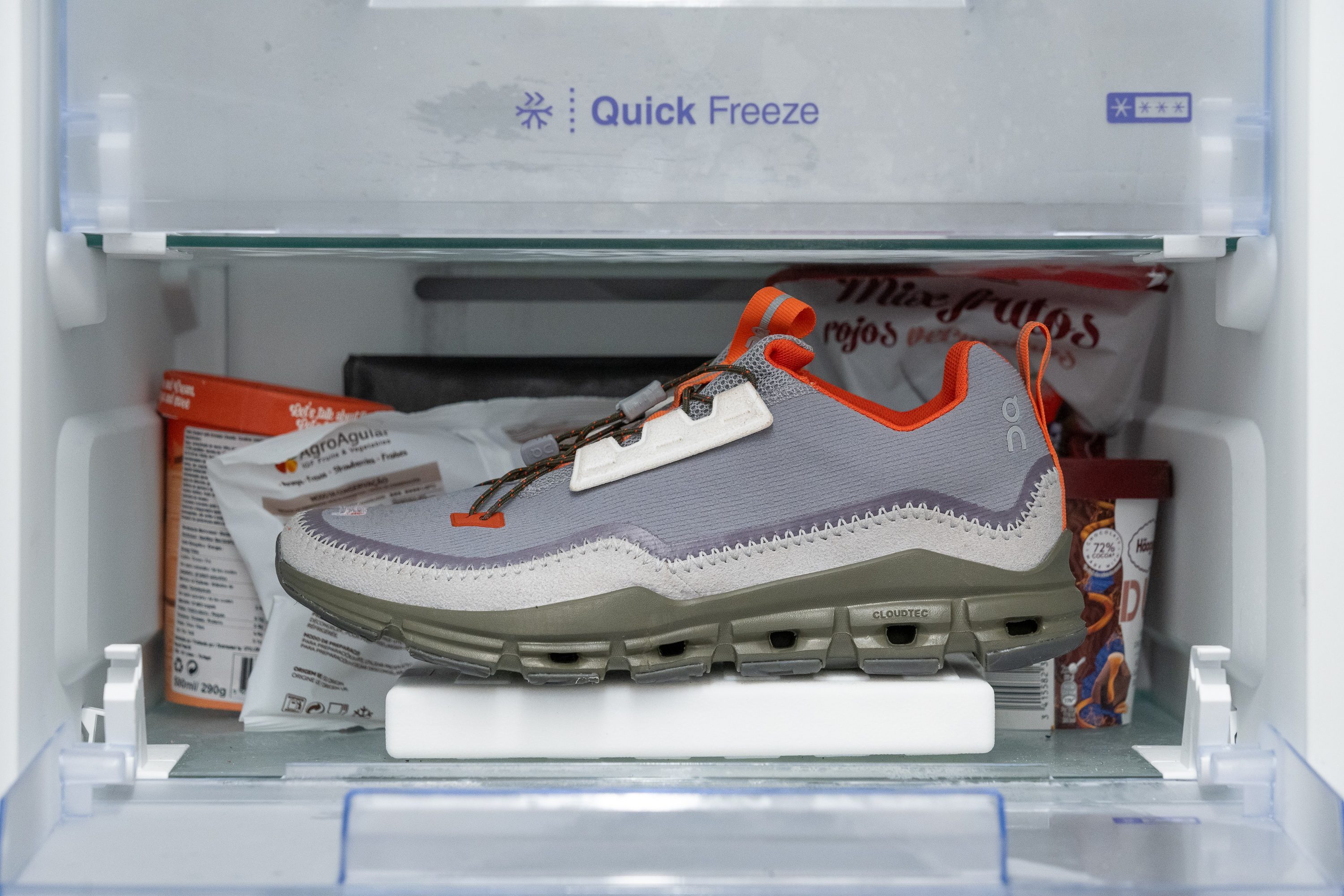
| Cloudaway | 28.9% |
| Average | 33.6% |
Insole thickness
A well-padded insole is there to guard the foot from the firm sole. Our caliper shows that it is 5.3 mm thick, which is typical for our lab-tested walking shoes.
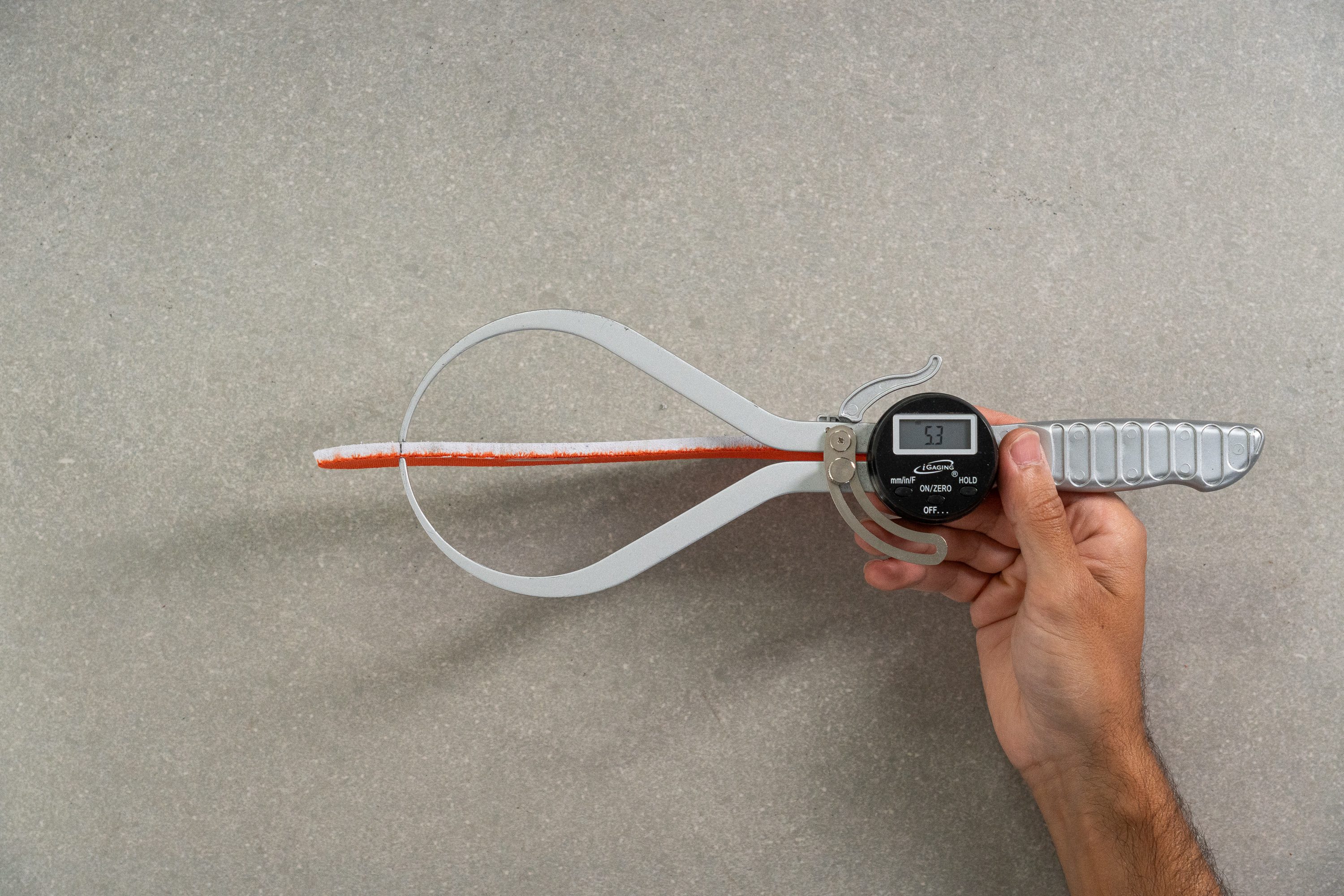
| Cloudaway | 5.3 mm |
| Average | 6.0 mm |
Stability
Lateral stability test
The On Cloudaway feels pretty stable for a neutral shoe that doesn't have any stability features! Based on our walking tests, we could even recommend this shoe to people with mild overpronation.
At the same time, it won't feel intrusive for people with regular (neutral) pronation. It feels more like an added touch of support.
Torsional rigidity
Twisting the shoe sideways revealed that the Cloudaway has some stiffness to it. We assessed its torsional rigidity as 4 out of 5. Nearly the stiffest!
The higher number on this scale means that the shoe doesn't bend over to the side that easily. This way, people whose ankles tend to roll inwards excessively are going to feel more surefooted in the Cloudaway.
| Cloudaway | 4 |
| Average | 2.8 |
Heel counter stiffness
Why not tag this walking shoe as "stability" then?
We still didn't get enough stiffness in its heel counter. After a manual assessment, we decided to rate this parameter with the lowest rating possible - 1 out of 5.
On the other hand, it doesn't irritate the Achilles and feels pretty comfortable and natural for people with neutral pronation.
| Cloudaway | 1 |
| Average | 2.3 |
Midsole width in the forefoot
Last but not least, the brand gave the Cloudaway a reasonable platform width.
In the widest part of the forefoot, we measured it to be 2 mm wider than average (110.9 mm). It's not that significant but is always a plus.
Having a wide platform to rely on, especially when navigating the off-roads, is essential.
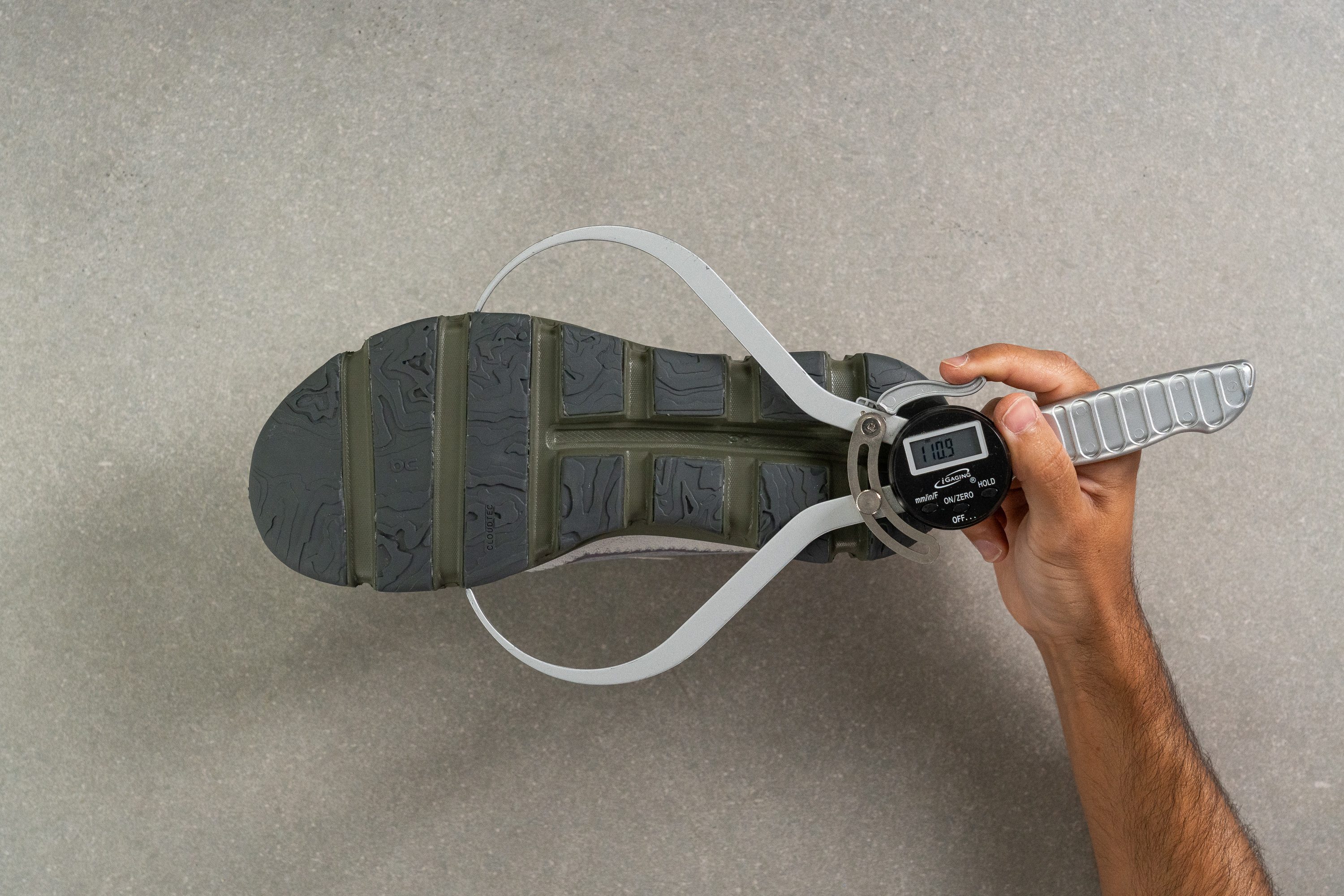
| Cloudaway | 110.9 mm |
| Average | 111.8 mm |
Midsole width in the heel
Nothing special here. The widest part of the heel measures 86.5 mm. Right at the average of walking shoes.
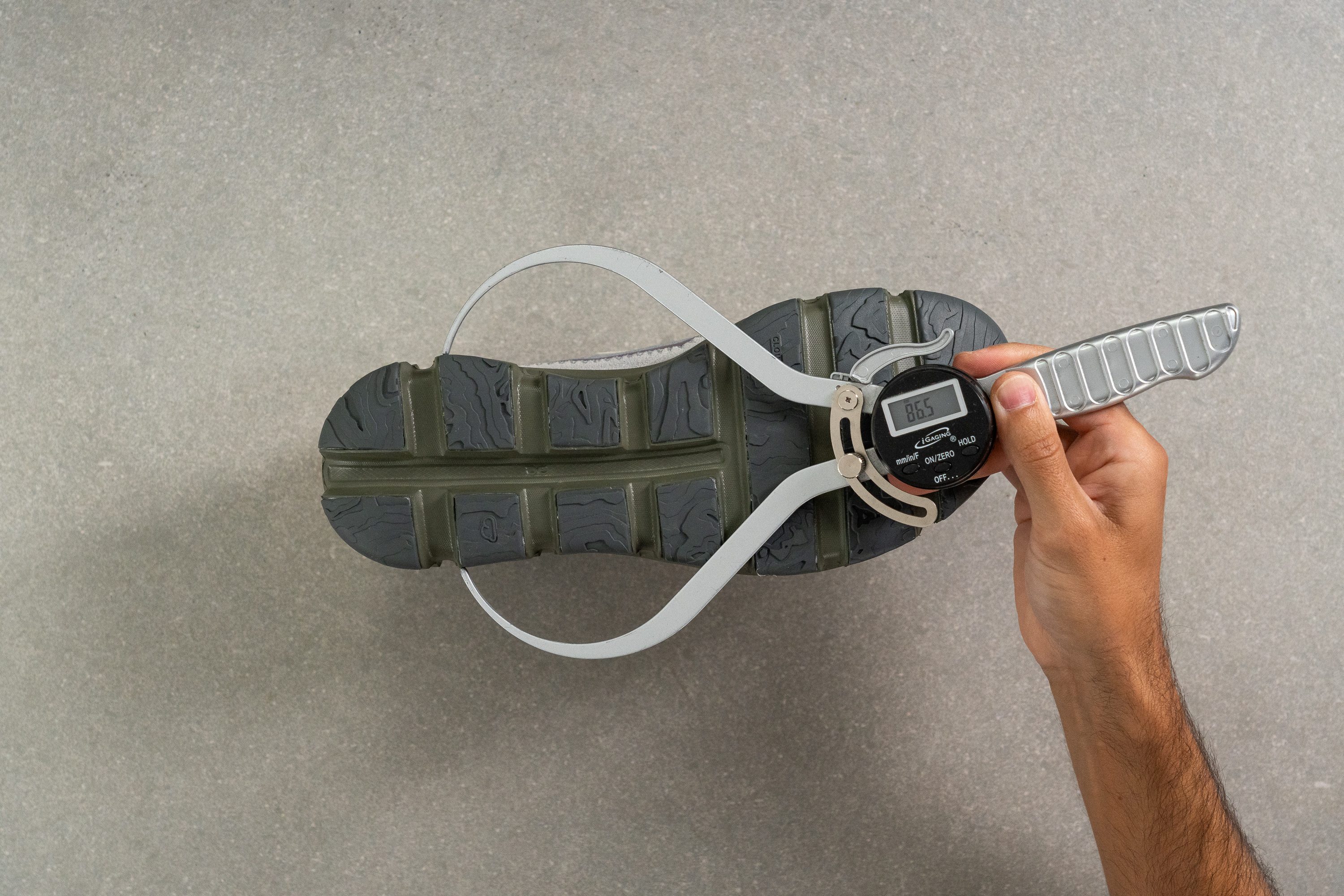
| Cloudaway | 86.5 mm |
| Average | 90.2 mm |
Flexibility
Stiffness
Wow, the Cloudaway is nowhere near the flexibility of its counterparts from the On brand. We are so used to the barefoot-like pliability of these shoes that this one caught us off-guard.
It took as much as 26.5N of force to bend the shoe to a 90-degree angle. This is 39% stiffer than our walking shoes on average!
This is a big plus for the shoe's overall support but a letdown for people who love a more natural walking experience.
| Cloudaway | 26.5N |
| Average | 20.6N |
Difference in stiffness in cold
And guess what? The shoe gets even stiffer in the cold.
Having repeated the measurement after keeping the shoe in the freezer for 20 minutes, the force gauge showed 38.2N. This is 22% stiffer compared to how the rest of our walking shoes turned out during the same test.
And the Cloudaway didn't even need to stiffen up by a higher percentage than the other walking shoes did. It stiffened up by 44% whereas the rest changed by 66%.
| Cloudaway | 44% |
| Average | 47.5% |
Grip / Traction
With its curious tread pattern, we believe that the On Cloudaway found a good formula to provide grip without putting on bulky lugs. In most urban and moderate outdoor scenarios, the shoe's traction performed admirably.
Fun fact: The shoe's treading is meaningful. It is a 3D print of the Engadin Valley in the Alps, also referred to as “the spiritual home” of the brand.
However, we warn against wearing this shoe in mud and wet grass as you really do need deep lugs to bite those surfaces effectively. If you need even deeper lugs than offered here, see our extensive collection of trail running shoes.
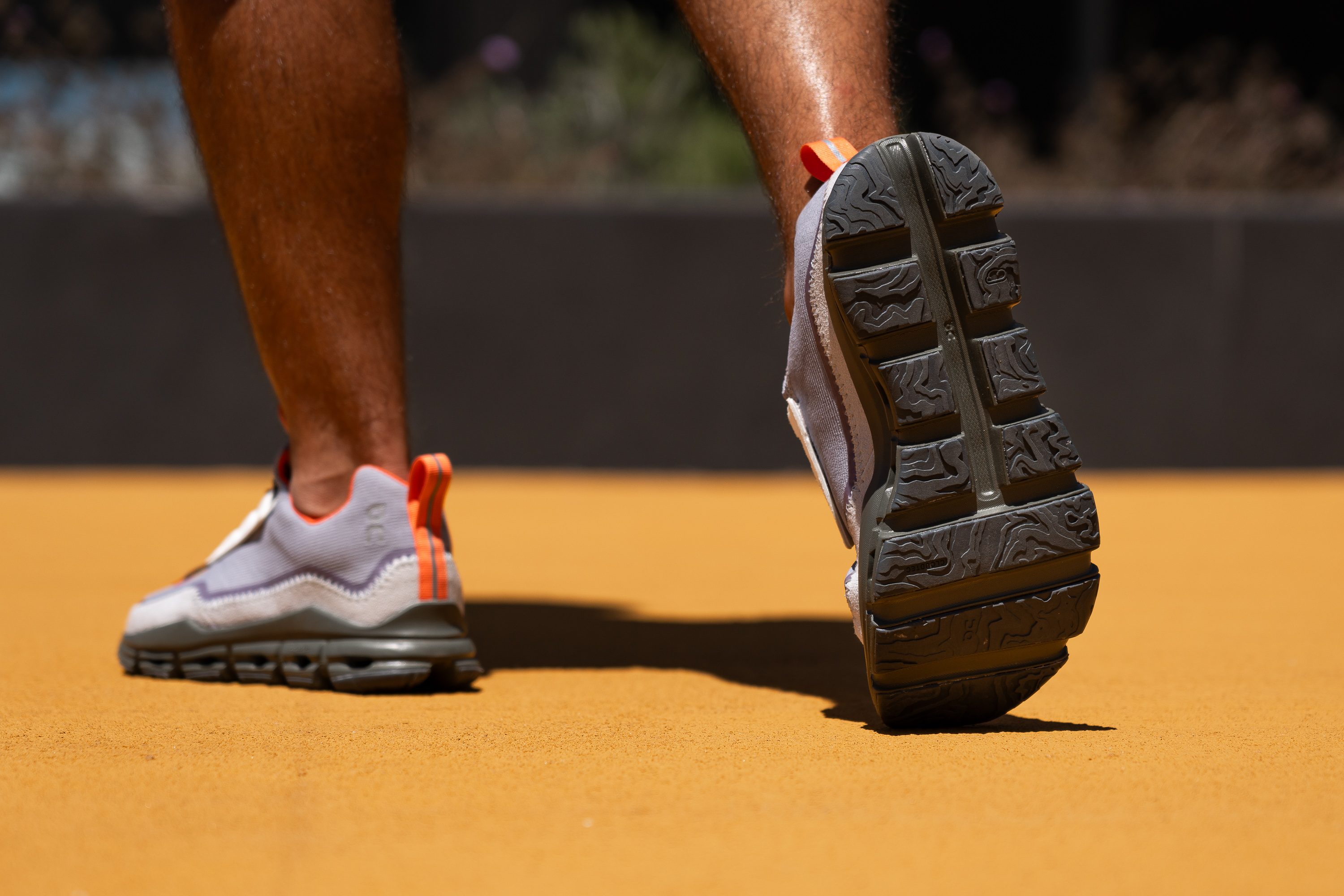
Size and fit
Toebox width at the widest part
So nice to see a roomy toebox in a shoe from On. This is a rare sight.
Using a caliper to measure the widest part of the toebox, we got 103.1 mm. This is notably wider than average, by a good 5.6 mm!
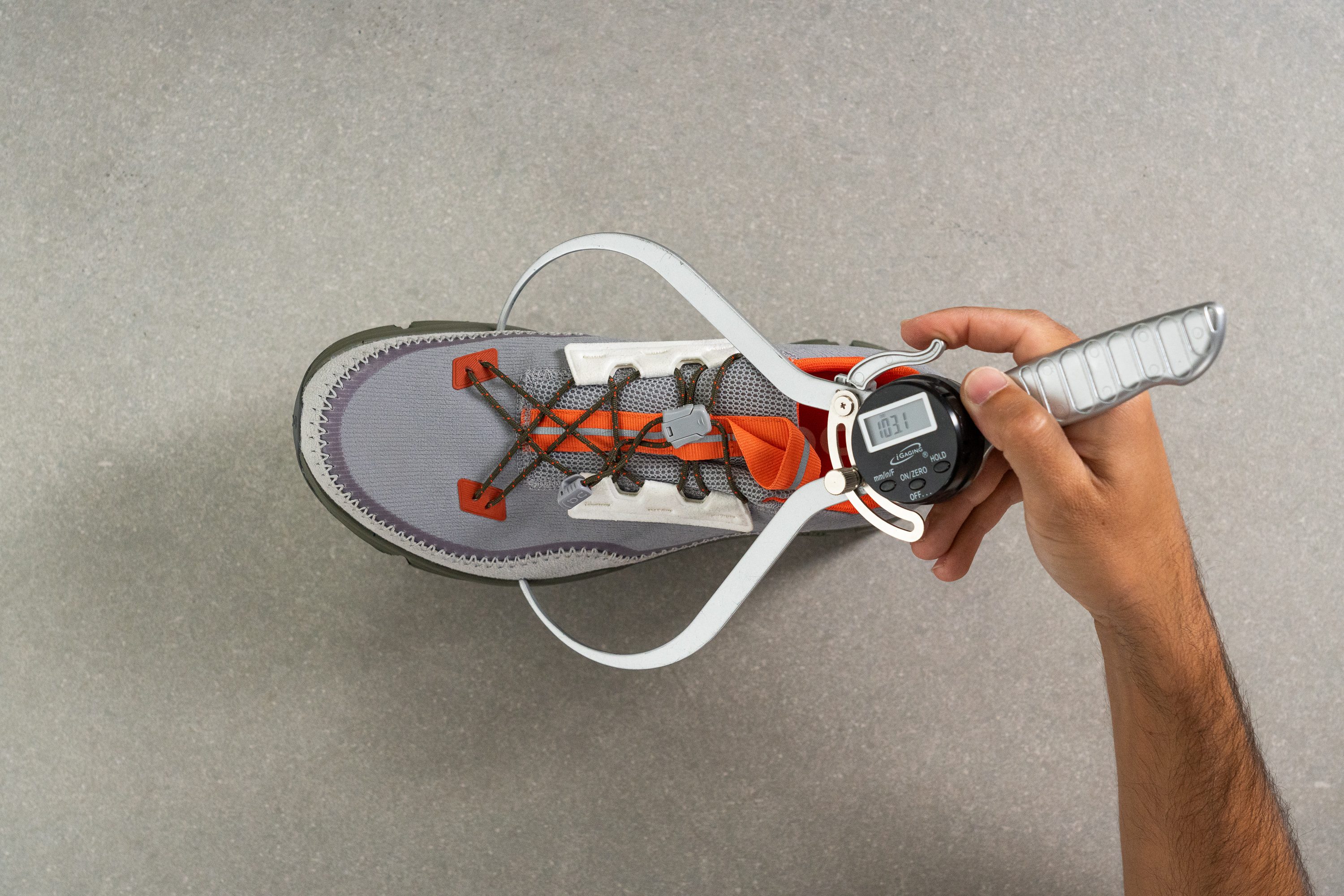
| Cloudaway | 103.1 mm |
| Average | 99.2 mm |
Toebox width at the big toe
Like most shoes, the Cloudaway gets narrower near the big toe. We measured this part at 79.2 mm, only 1 mm wider than average.
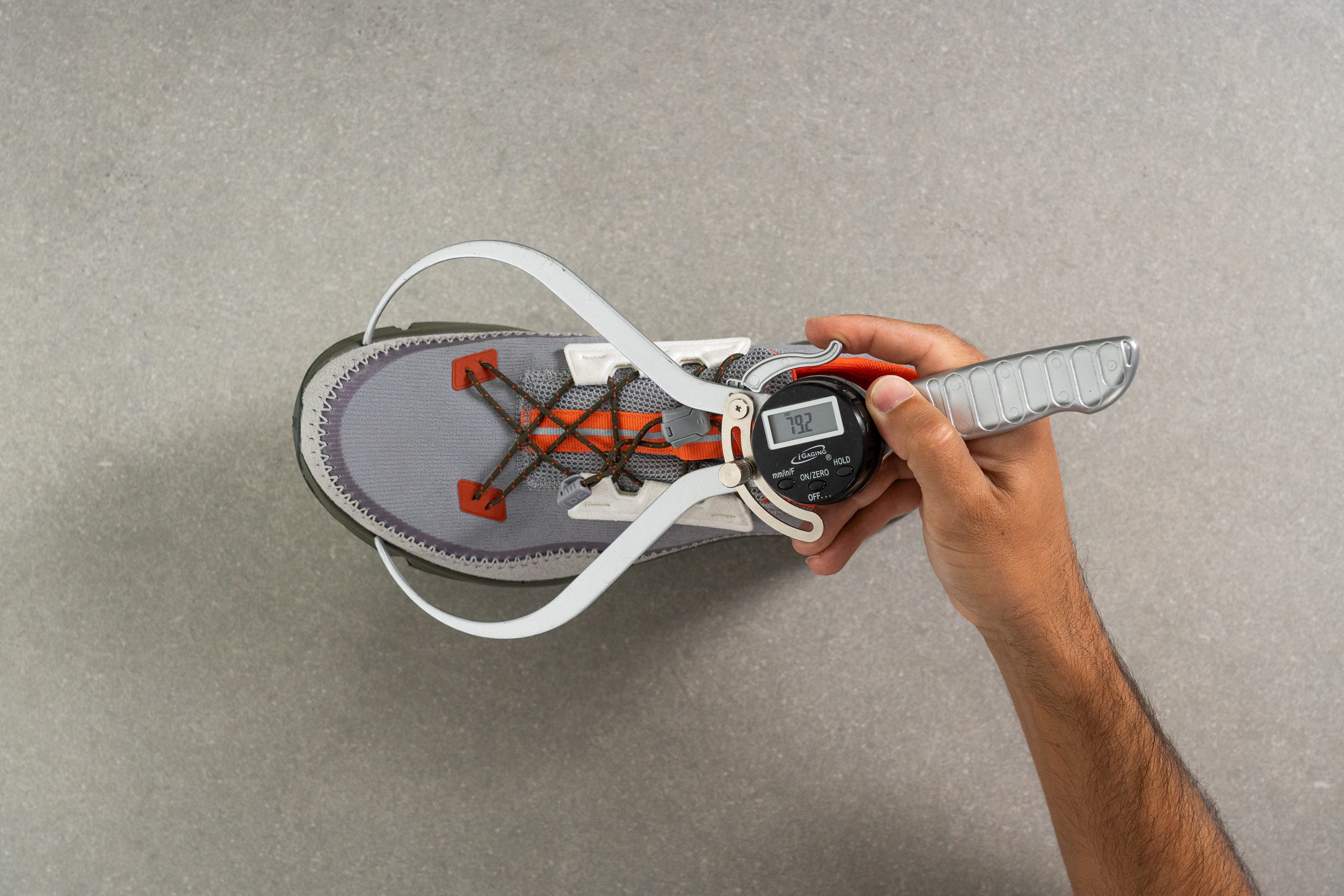
Based on these two measurements, this could have been a great day for wide feet. But the shoe's overall upper design kept it in the medium sector.
As you can see, the textile is very sturdy and barely stretches at all! It wraps around the foot quite snugly. Too snugly to recommend it for wide feet.
| Cloudaway | 79.2 mm |
| Average | 78.6 mm |
Tongue: gusset type
The Cloudaway comes in a "bootie-like" design where the tongue is fully integrated on the upper. It helps to create that secure containment for the foot inside the shoe.
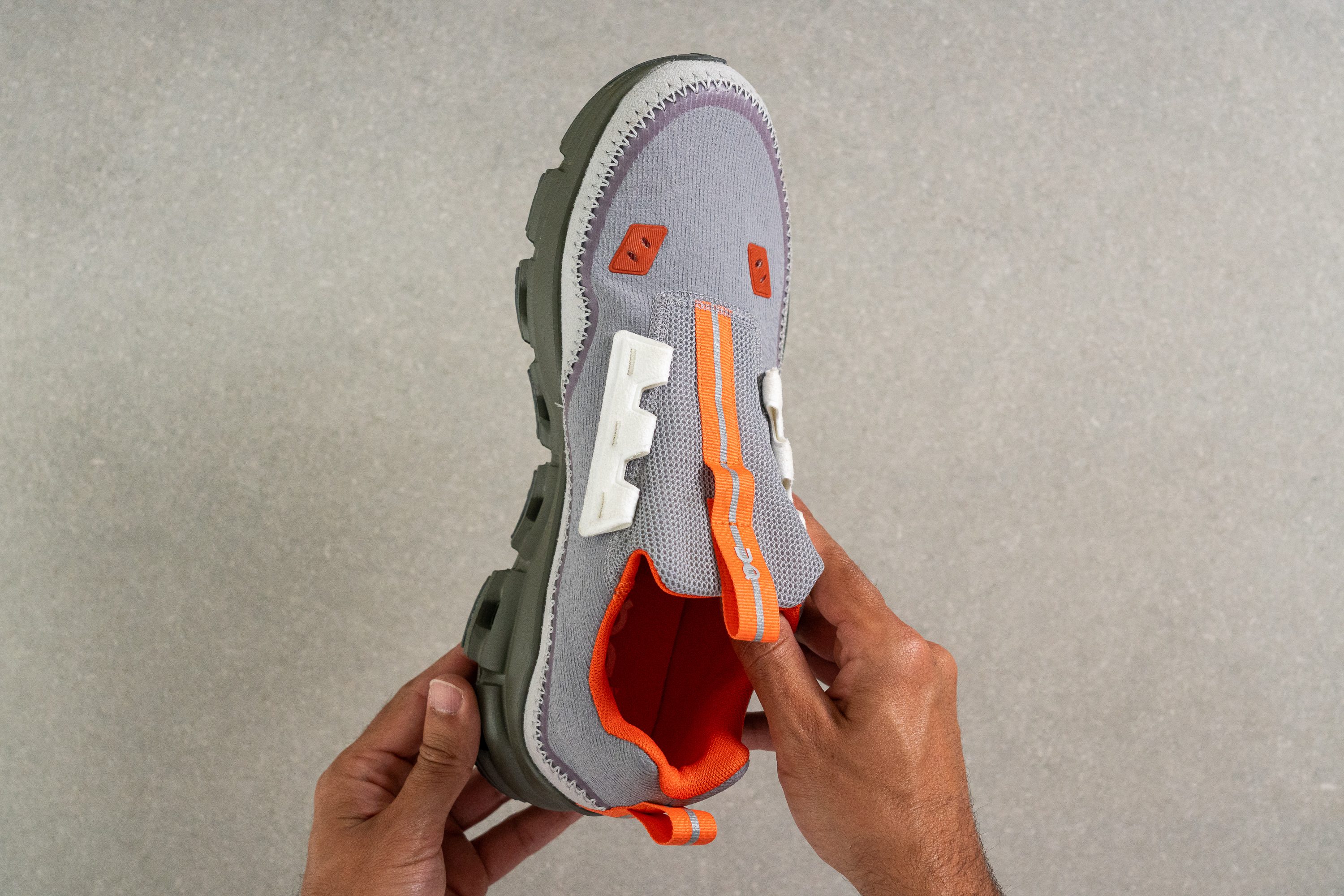
| Cloudaway | Sock like |
Comfort
Tongue padding
The tongue is generously padded in this shoe. With a 5.1 mm thickness, we found it to be 1.2 mm thicker than the average. There are no lace bites and comfort is all around.
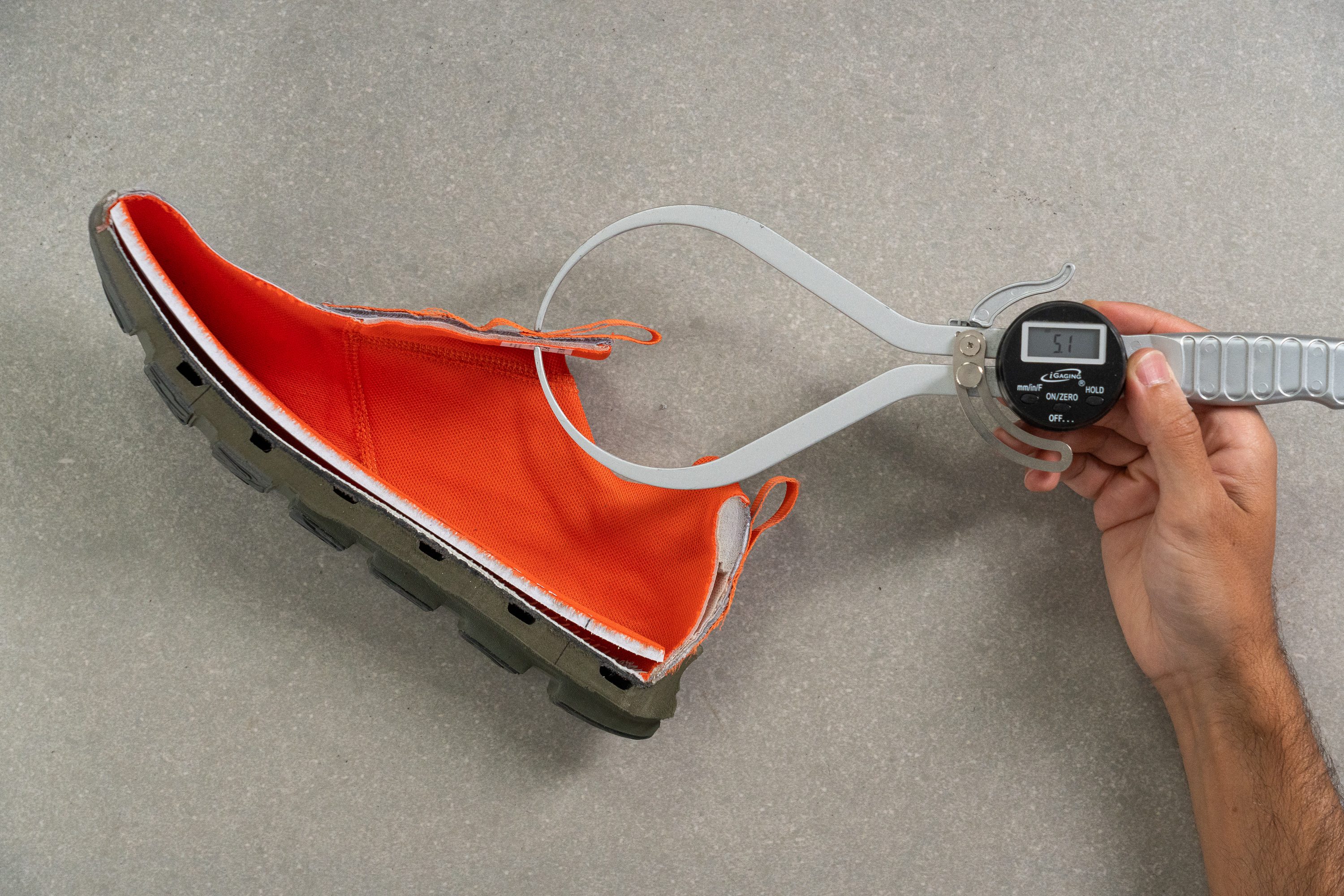
| Cloudaway | 5.1 mm |
| Average | 5.2 mm |
Heel tab
A large finger loop is attached at the heel of the shoe. The loop is large enough to fit our index finger as we slide the foot inside the shoe. Very handy given the shoe's bootie construction!
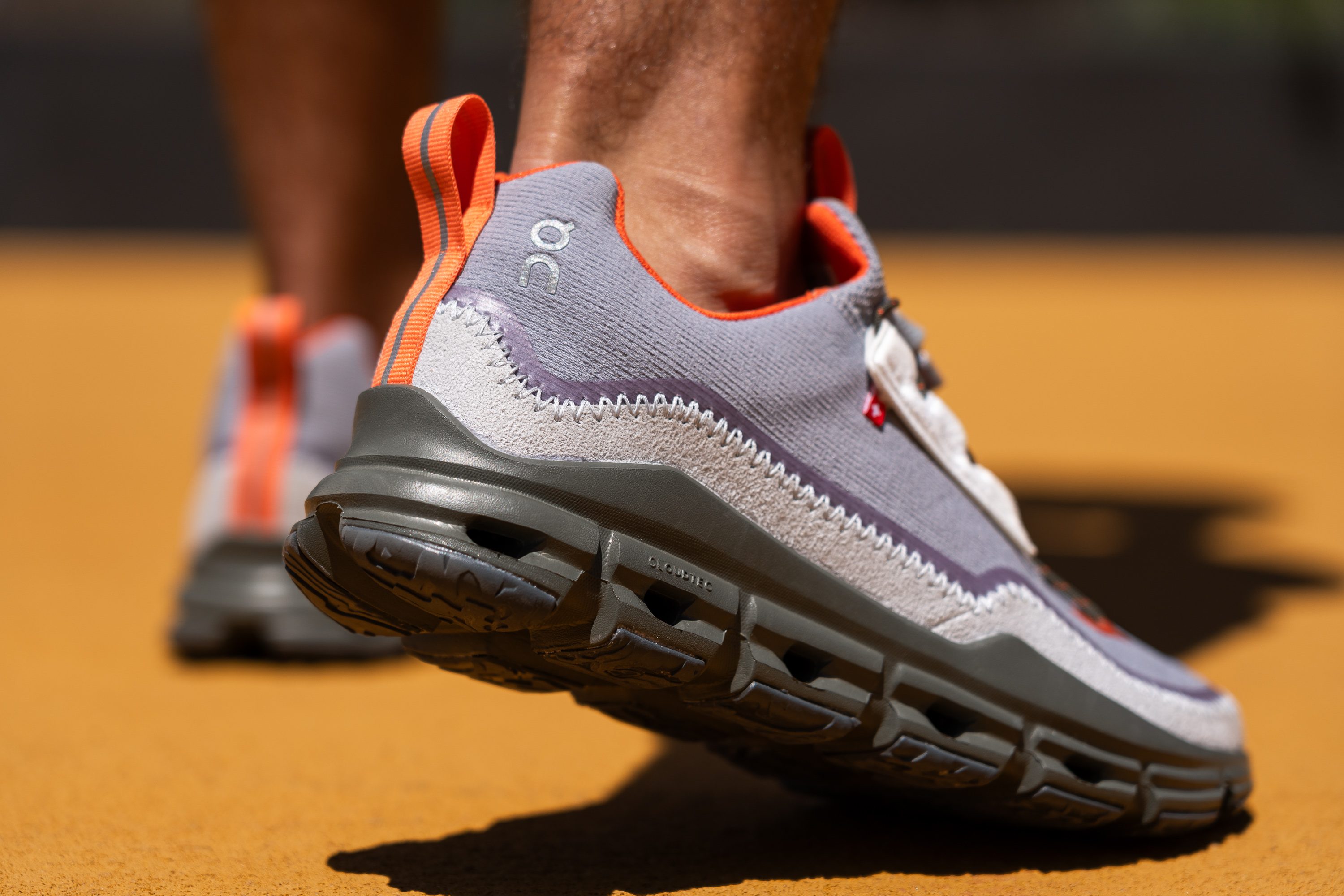
| Cloudaway | Finger loop |
Removable insole
The insole is removable in the Cloudaway. You can easily customize the underfoot padding as you wish.
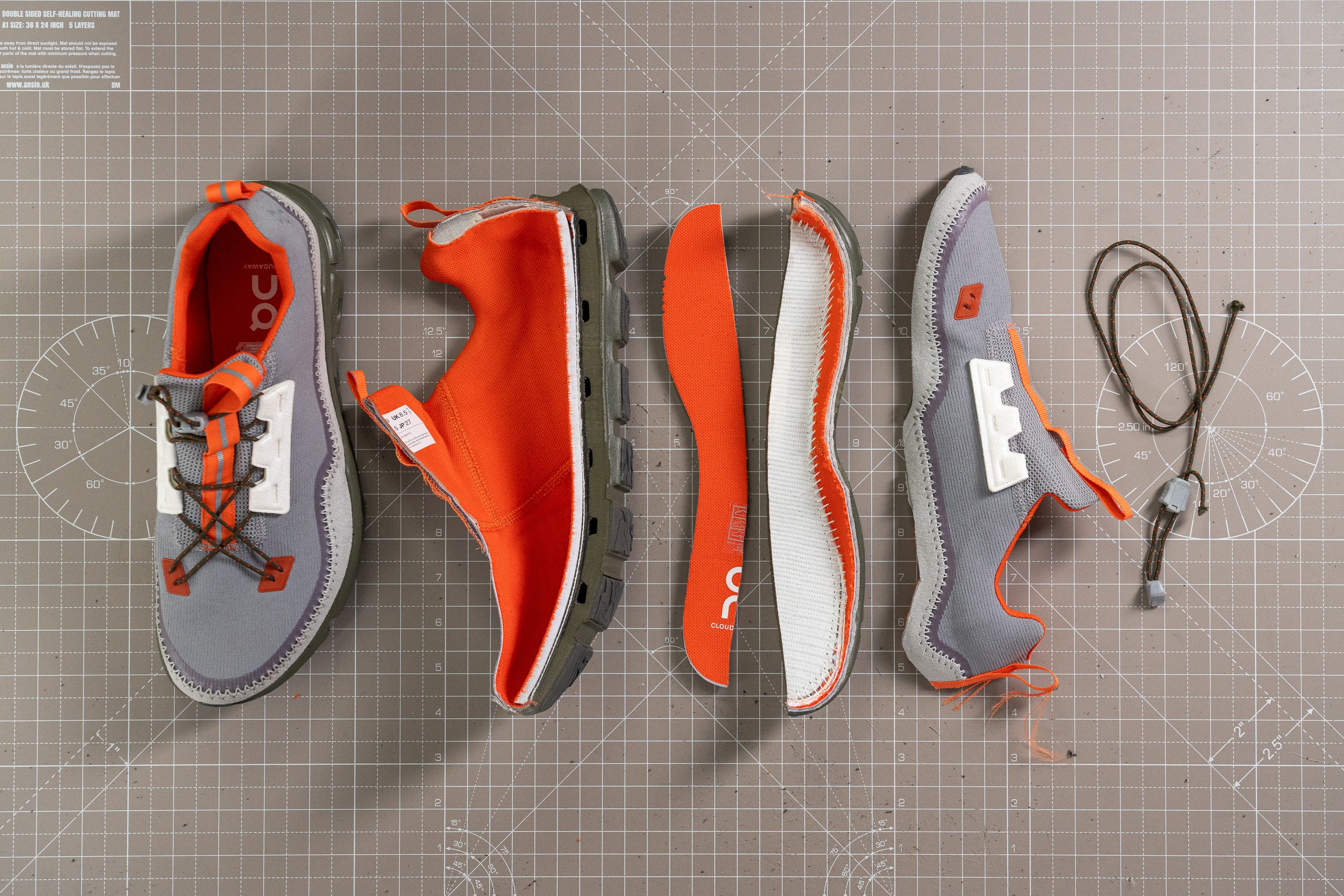
| Cloudaway | Yes |
Misc
Reflective elements
The shoe features subtle reflective elements on the top and back. A minor thing that keeps you safe coming back home in the afterhours.
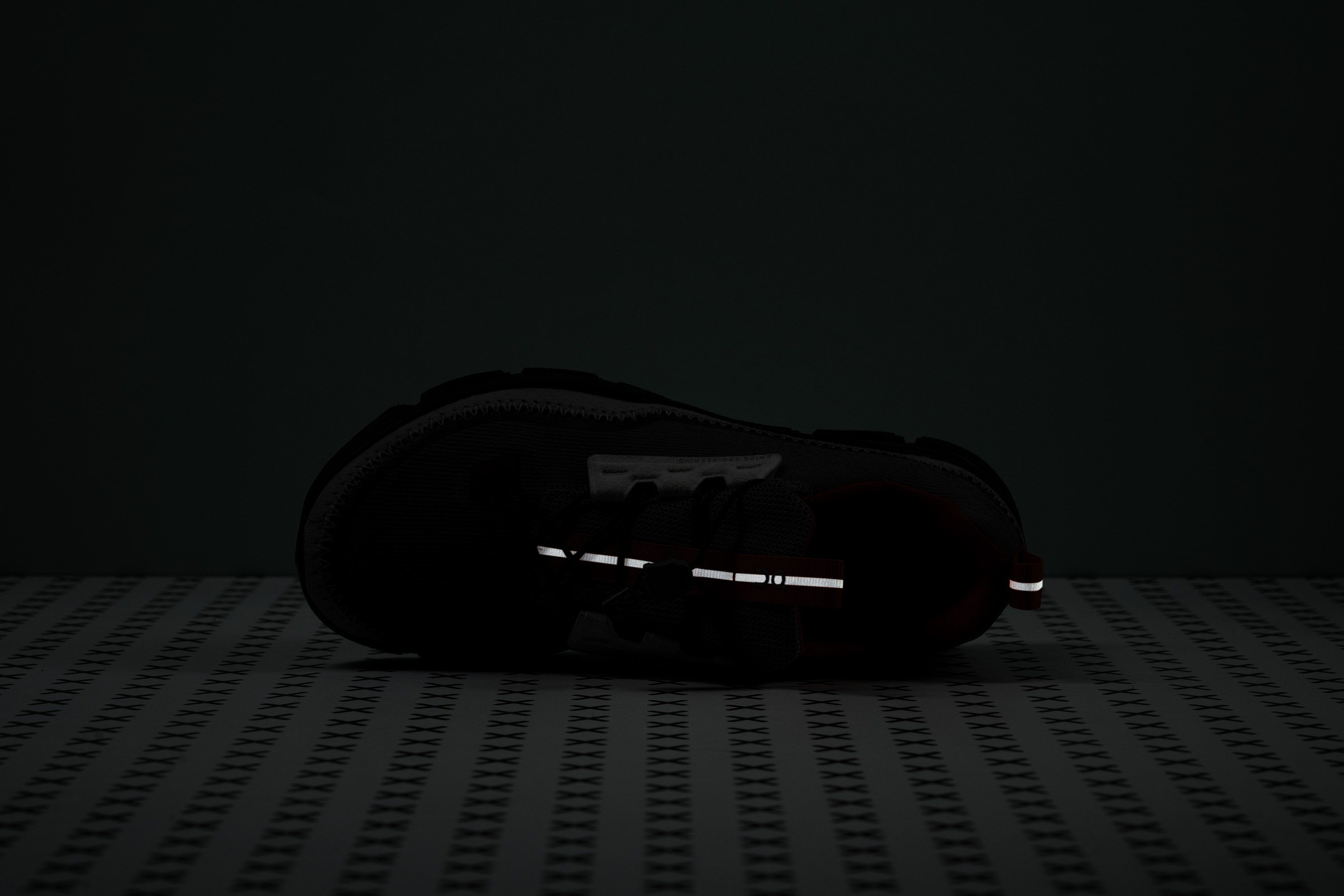
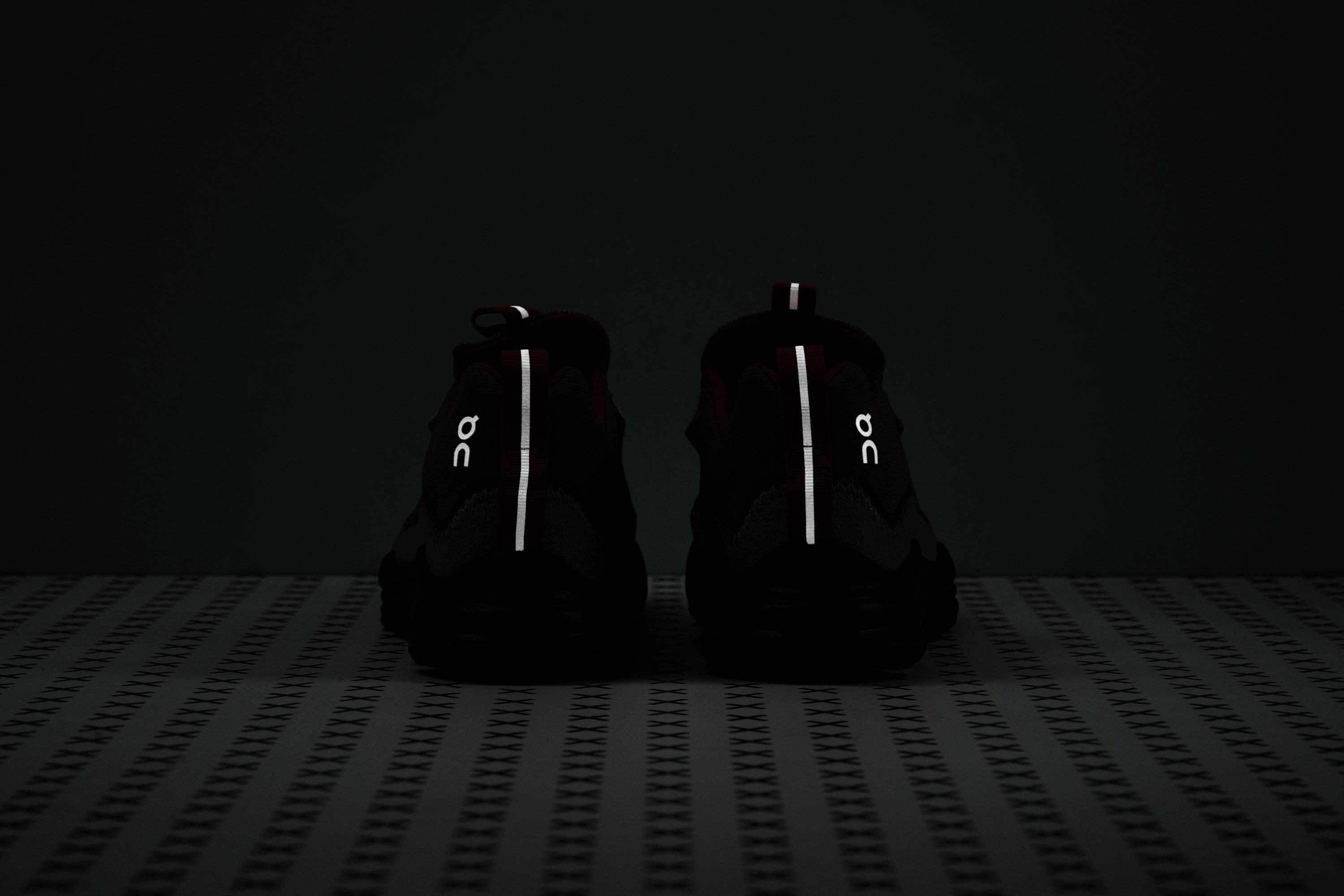
| Cloudaway | Yes |
Sustainable materials
On Cloudaway is the shoe for those who care. It contains 20% of recycled materials in total. The upper is the most sustainable part of the shoe as 90% of it is made of recycled content. The rubber outsole also has 10% of eco-friendly materials in its makeup.

